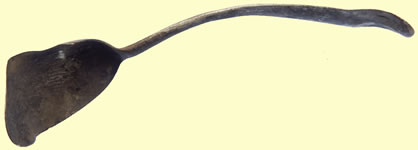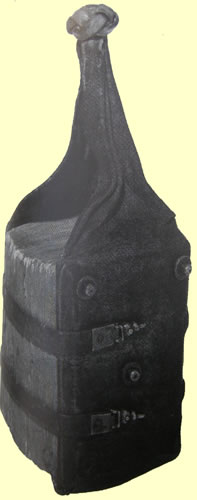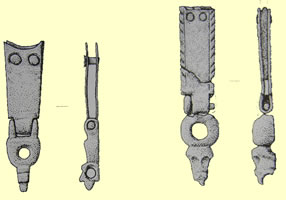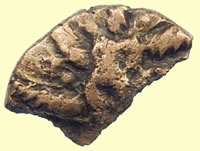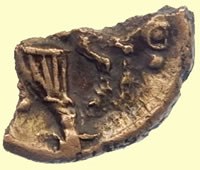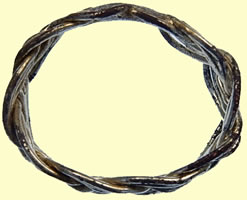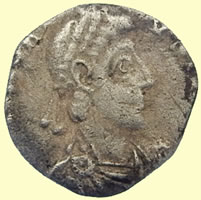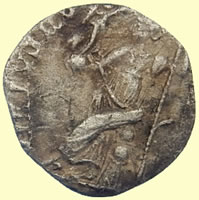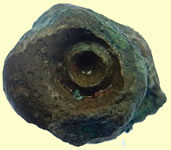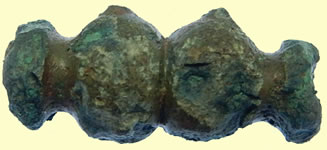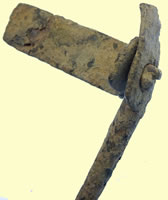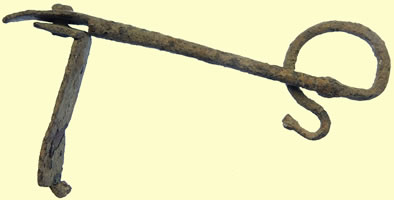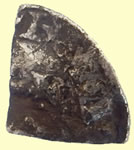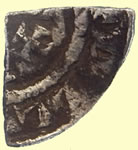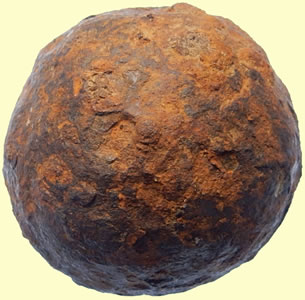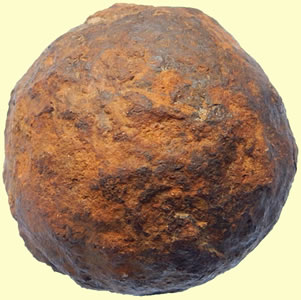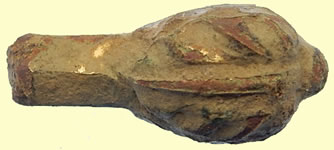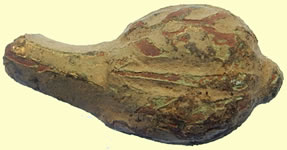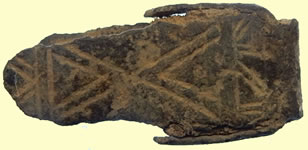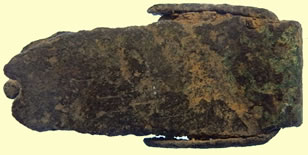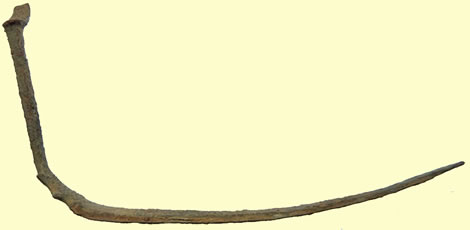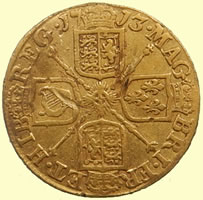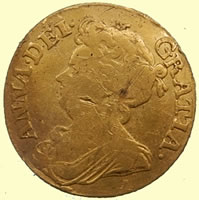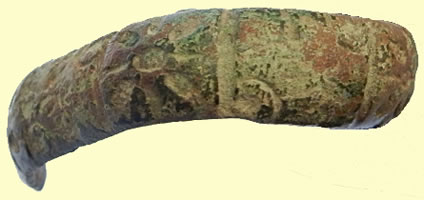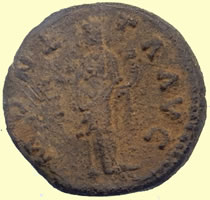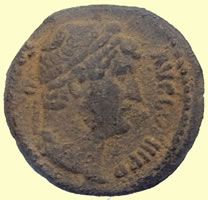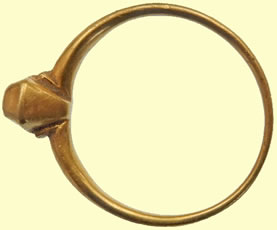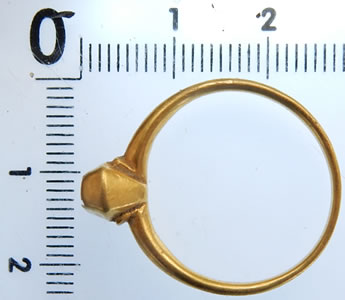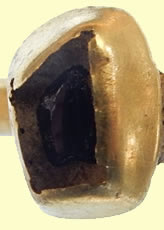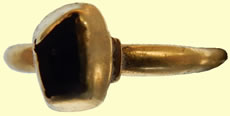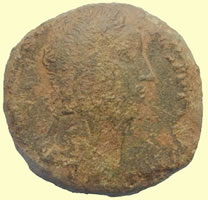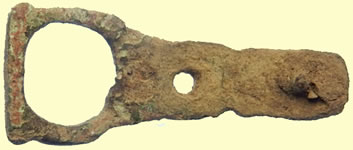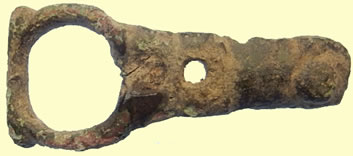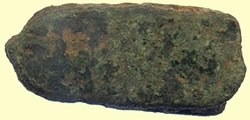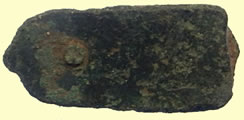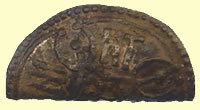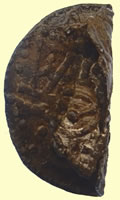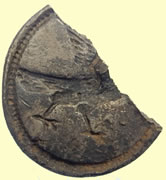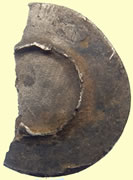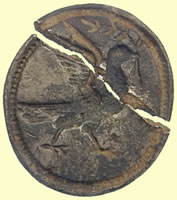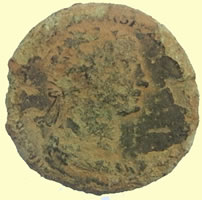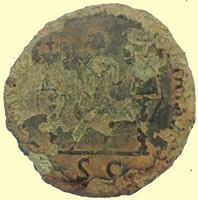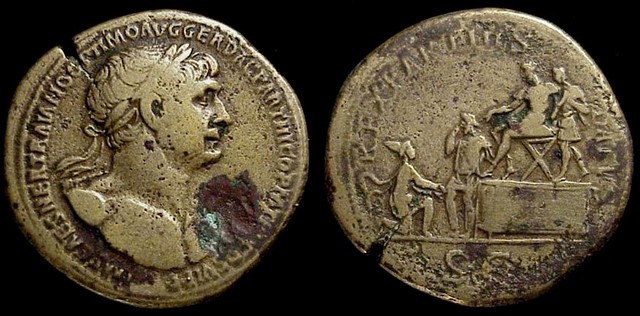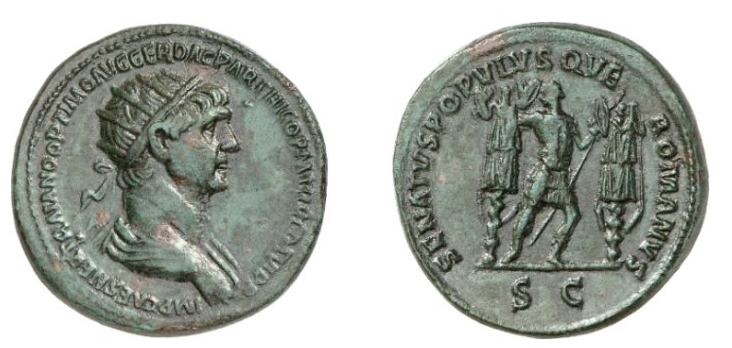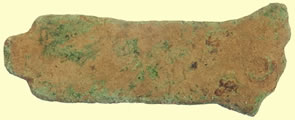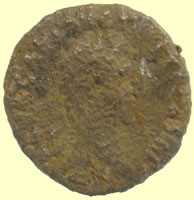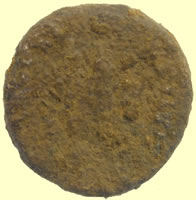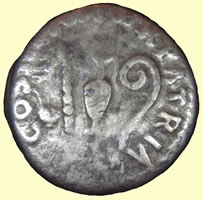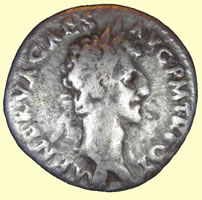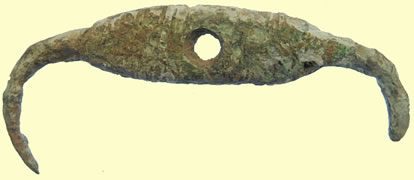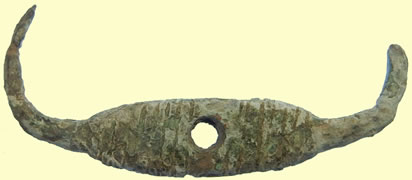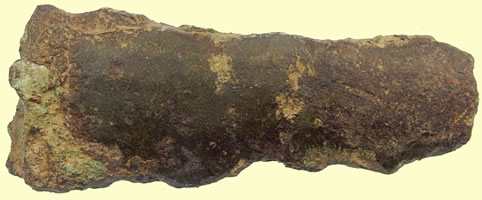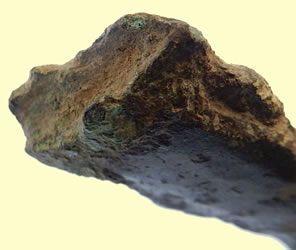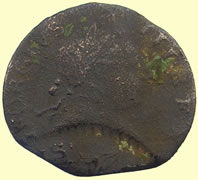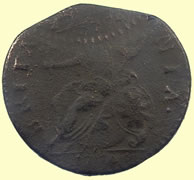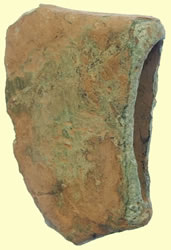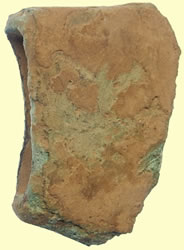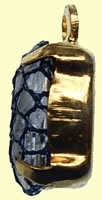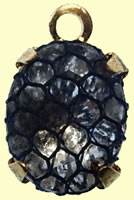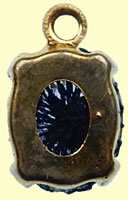

Metal detecting holidays in England with the World's most successful metal detecting club.
Twinned with Midwest Historical Research Society USA
2015 Oct Finds page |
 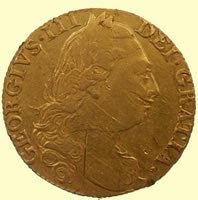 |
|||||||||||||||
1777 George III milled gold full guinea (21 shillings) 8.37g, 24.8mm |
|||||||||||||||
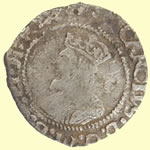 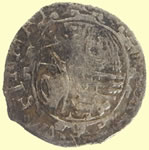 |
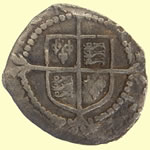 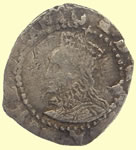 |
||||||||||||||
| 1644-5 Charles 1st hammered silver penny - Gerb mint mark Chester | 1587-9 Elizabeth 1st hammered silver penny | ||||||||||||||
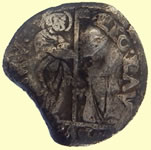 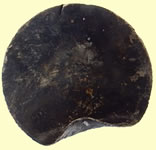 |
 |
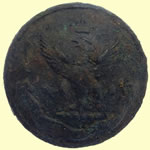 |
|||||||||||||
1501-1521 Leonardo Lauredan, Doge Rev: LAVS TIBI SOLI (Thee Alone be Praised). Haloed figure of Christ holding a cross. Obv: LE LAV DVX S M V (Leonardo Lauredan, Doge. St Mark of Venice.) Doge kneeling before Saint Mark. |
16thC Tudor clothing fastener | 19thC livery button | |||||||||||||
Roman military mount A near identical mount is in Benet’s Artefacts second volume, page171 number R09-0403. Described as Mount (Eagle) 50mm. Spread wings with feathers detailed. Mounted on a stem. Perhaps from a military standard. |
|||||||||||||||
1768-1769 Georgian solid silver spoon - initialed MW Maker PR - Philip Roker III - London |
|||||||||||||||
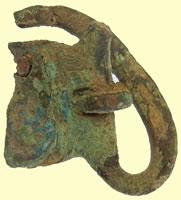 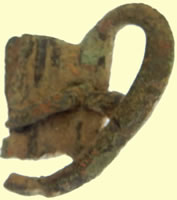 |
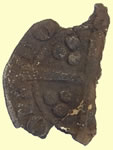 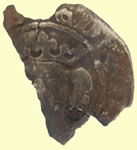 |
||||||||||||||
| Medieval decorated enameled buckle with integral plate | 1279 Edward 1st hammered silver penny Obv EDWR ***** Rev ***ON/DO* - London mint |
||||||||||||||
 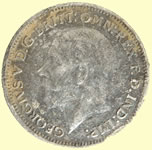 |
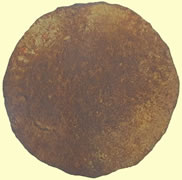 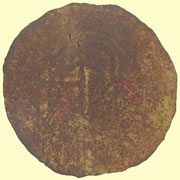 |
||||||||||||||
| 1931 George V milled silver sixpence | 1586 Hans Krauwincel II Rose orb Jeton HANNS KRAVWINCKEL IN NVRENB |
||||||||||||||
|
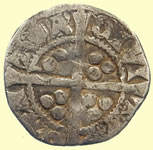 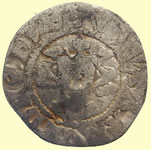 |
||||||||||||||
| Medieval silver long cross penny | 1279 Edward 1st hammered silver penny Obv EDWAR ANGL DNS HYB Rev CIVI/TAS/LON/DON - London mint |
||||||||||||||
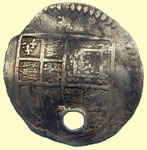 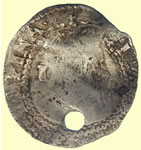 |
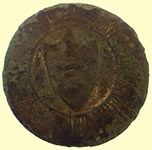 |
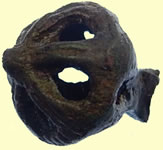 |
|||||||||||||
| 1603 -4 James 1st hammered silver penny | 19thC button | 16thC Tudor button | |||||||||||||
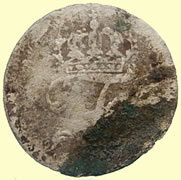 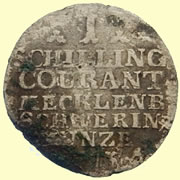 |
 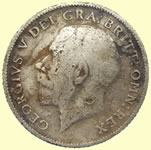 |
||||||||||||||
Obv Crown FF Rev 1 Schilling Courant Mecklenb Schwerin Munze |
1915 George V milled silver sixpence | ||||||||||||||
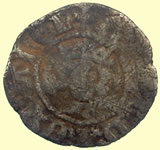 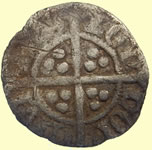 |
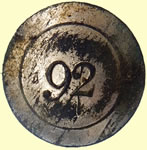 |
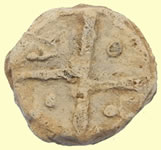 |
|||||||||||||
1377-1399 Richard II hammered silver half penny Obv D*REX ANGL + Rev CIVI/TAS/LON/DON - London mint |
Officer - 1798-1830 92nd Regiment of foot buttons |
15thC lead token - type 2 | |||||||||||||
The distinguishing feature of this book format is its long extension of the leather cover-along the lower edge of the book, which allows it to be carried by hand, or be tucked under the belt, held there by a large knob or hook incorporated into the overhanging-leather. Judging by contemporaneous representations in paintings, sculptures, drawings and in verbal descriptions the majority was made between about 1450 and 1650, mainly in what is now Germany, the Netherlands and England. Only about two dozen still exist, making it a very rare witness to medieval life between six hundred and seven hundred years ago. |
|||||||||||||||
Addedomarus 45BC Celtic gold full stater fragment - sent to museum as hoard addendum 16.5mm,2.31g |
|||||||||||||||
|
|||||||||||||||
Post medieval gold plated copper twisted wire ring 2.03g, 21.5mm |
|||||||||||||||
5thC Roman silver sent for ID |
|||||||||||||||
The reason that this coin seems so thin is that it's the way they were made. The Romans were already (and had for some time been) experiencing the shortage of silver which would extend well into "modern" times (taking the long view) and was the reason that medieval deniers all tend to be such fish scales. This is a siliqua of Honorius. Honorius was one of the last of the Western emperors and the one during whose reign the Visigoths sacked Rome in 410 AD.Honorius ascended to the purple at the age of 9, in 393 AD, so you know there was someone else behind the scenery pulling the strings. He was actually around for a pretty long time as rulers went (and they mostly went) in those days. He survived until 423 AD. but isn't known for much of anything except happening to be in power when Rome was invaded. Mark If I'm interpreting the bottom seriphs of the obverse letters correctly (and I'm pretty certain I am) this is Honorius - D N HONORIVS P F AVG. with reverse, VIRTVS ROMANORVM - Roma seated left on cuirass holding Victory on globe and spear. This one, as significantly clipped as it is (it quite possibly was "officially clipped" in order to bring its weight into line with Saxon Sceats circulating in the late 5th and 6th centuries) has lost all traces of the mint mark. This type and denomination was only minted at the "western" mints, Trier, Milan, Rome, Ravenna and Aquilea, Constantinople struck the Vota types of Siliqua - range of possible years, 397 - 408 AD. considering the production of all mints - since Trier is very rare, 402-408 is a more realistic time-frame for the VIRTVS ROMANORVM Siliquae. Mark |
|||||||||||||||
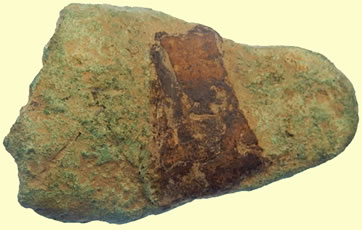 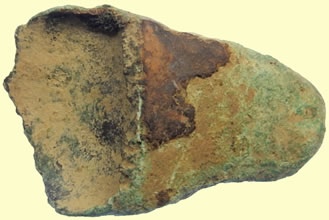 |
|||||||||||||||
| c1000 BC Bronze Age socketed implement fragment | |||||||||||||||
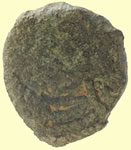 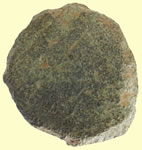 |
 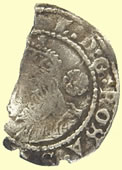 |
||||||||||||||
| 14th/15thC 1/2 Gold Ryal - King with sword and shield standing in a ship type | 1574 Elizabeth 1st hammered silver three pence | ||||||||||||||
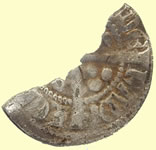 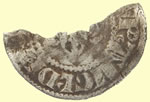 |
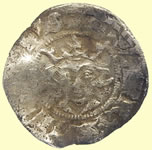 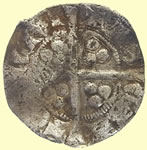 |
||||||||||||||
1279 Edward 1st hammered silver penny Obv **AR ANGL DN*** Rev *DE /HADE/LE*** - Bury St Edmunds mint - Moneyer Robert de Hadlelie |
1279 Edward 1st hammered silver penny Obv EDWAR R ANGL DNS HYB Rev CIVI/TAS/CAN/TOR- Canterbury mint |
||||||||||||||
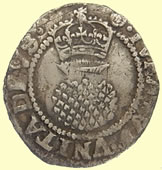 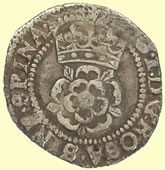 |
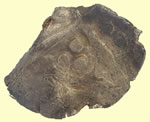 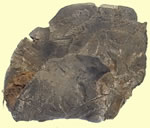 |
||||||||||||||
| 1603 James 1st hammered silver half groat | Medieval hammered silver long cross penny | ||||||||||||||
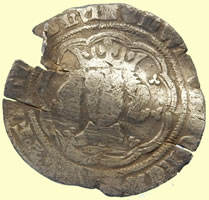 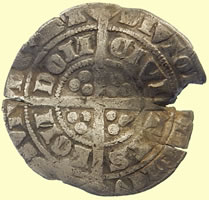 |
|||||||||||||||
1356- 1361 Edward III hammered silver groat - Pre Treaty period Top arches not fleured Obv +EDWARD DG REX ANGL Z FRANC hYB Rev CIVI/TAS/LON/DON - London mint |
|||||||||||||||
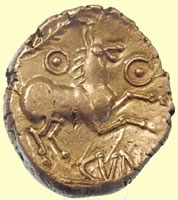 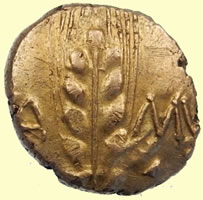 |
|||||||||||||||
10-40 AD Cunobelin full gold stater - sent to PAS for recording 5.43g,19.8mm |
|||||||||||||||
 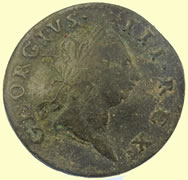 |
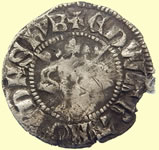 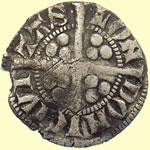 |
||||||||||||||
| Stunning condition 1769 Irish George III milled copper half penny | 1279 Edward 1st hammered silver penny Obv EDWAR ANGL DNS HYB Rev CIVI/TAS/LON/DON - London mint |
||||||||||||||
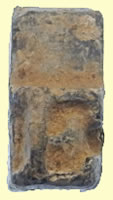 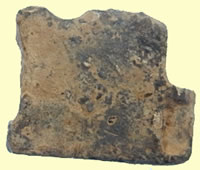 |
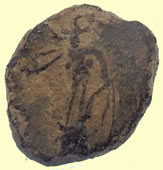 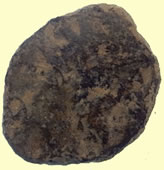 |
||||||||||||||
| Georgian printing press block | Mid 4thC Roman barbarous radiate bronze coin | ||||||||||||||
British Celtic 'Looped' Toggle Fastener
Copper-alloy, Circa 1st century BC-1st century AD. A cast fitting in the form of an elliptical bulb with flat disc terminals and attachment loop missing . Such fittings were used as toggles to fasten garments, passing through a slit or loop. Reference: cf. looped variants in Murawski, P. Benet's Artefacts of England and the United Kingdom, Ely,
|
|||||||||||||||
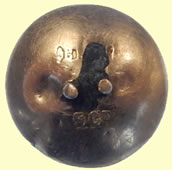 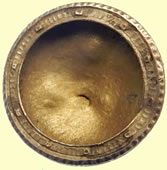 |
|||||||||||||||
| Decorated Victorian 9 carat gold button with missing gem stone | |||||||||||||||
 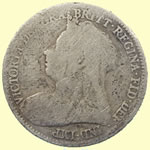 |
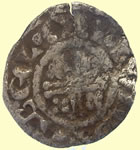 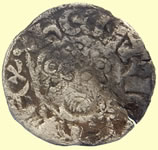 |
||||||||||||||
| 1897 Victoria milled silver sixpence | 1199 King John hammered silver short cross penny - Class 5c - St Andrews cross Obv hENRICVS REX Rev ABEL.ON.LVND - Moneyer Abel of London mint |
||||||||||||||
|
|||||||||||||||
| Unknown 10inch long widget - no idea what it was used for yet | |||||||||||||||
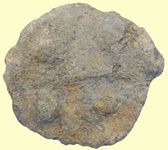 |
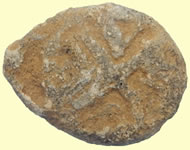 |
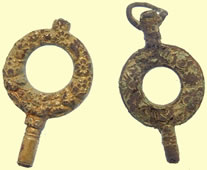 |
|||||||||||||
| 15thC lead token - type 2 | 15thC lead token | Georgian watch winders | |||||||||||||
 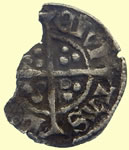 |
  |
||||||||||||||
1377-1399 Richard II hammered silver half penny Obv + RICARD x REX x ANGL Rev CIVI/TAS/LON/DON- London mint |
1216 Henry III hammered silver short cross half penny Rev LVND - London mint |
||||||||||||||
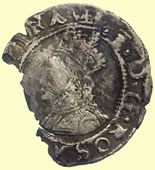 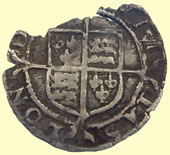 |
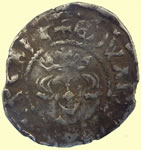 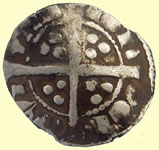 |
||||||||||||||
| 1567 -70 Elizabeth 1st hammered silver half groat- Coronet mint mark | 1279 Edward 1st hammered silver penny Obv EDWAR ANGL DNS HYB Rev CIVI/TAS/LON/DON - London mint |
||||||||||||||
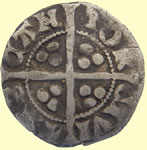 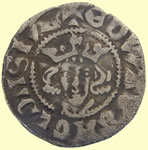 |
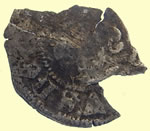 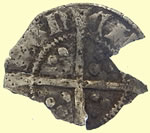 |
||||||||||||||
1279 Edward 1st hammered silver penny Obv EDWAR ANGL DNS HYB Rev CIVI/TAS/CAN/TOR -Canterbury mint |
1279 Edward 1st hammered silver half penny Obv ** VS REX Rev /DON/CI** - London mint
|
||||||||||||||
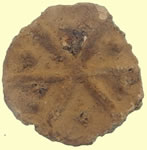 |
 |
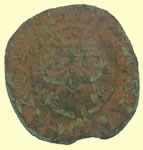 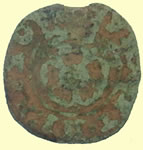 |
|||||||||||||
| 15thC lead token | 1500-1700 mount | 1634 Charles 1st hammered copper rose farthing | |||||||||||||
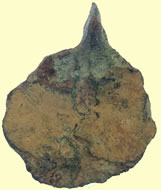 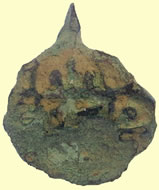 |
 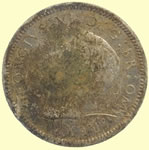 |
||||||||||||||
| Medieval harness pendant | 1939 George V milled silver sixpence | ||||||||||||||
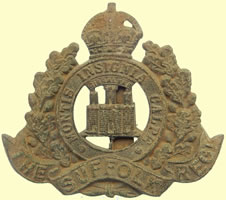 |
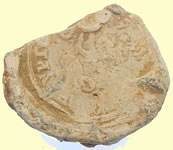 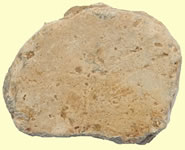 |
||||||||||||||
| WW1 Suffolk regiment cap badge | Post medieval lead bale seal | ||||||||||||||
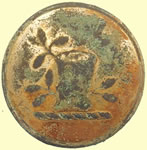 |
 |
  |
|||||||||||||
| 19thC livery button | 18thC Royal Artillery button | Georgian silver button | |||||||||||||
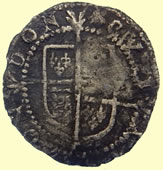 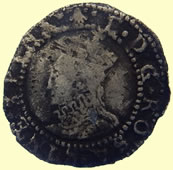 |
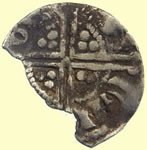 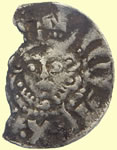 |
||||||||||||||
| 1584 -6 Elizabeth 1st hammered silver half groat - Escallop mint mark | 1247 Henry III hammered silver voided long cross penny | ||||||||||||||
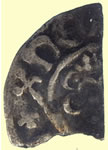 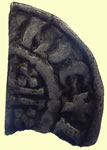 |
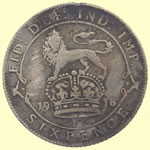 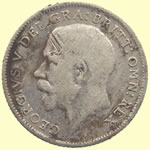 |
||||||||||||||
1216 Henry III hammered silver voided short cross penny Obv hEN** Rev VNDE+ London mint |
1918 George V milled silver sixpence | ||||||||||||||
  |
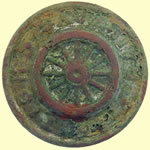 |
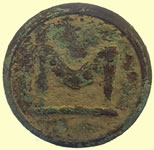 |
|||||||||||||
| Medieval long cross hammered silver half penny | 20thC British rail button | 19thC livery button | |||||||||||||
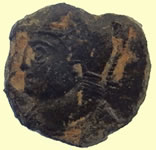 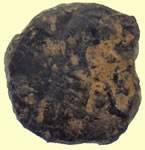 |
 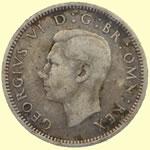 |
||||||||||||||
| 4thC Roman bronze coin | 1946 George VI milled silver sixpence | ||||||||||||||
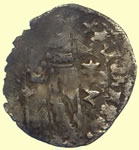 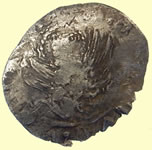 |
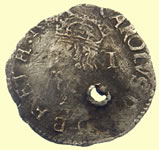 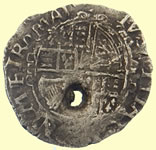 |
||||||||||||||
| Italian States-Venice, Antonio Venier as Doge (1382-1400), Soldino, Venice Mint + . ANTO. VE_NERIO DVX . Doge standing left, holding banner, * Z across fields + . S . MARCVS . VENETI . Winged lion of St. Mark facing left, holding book with both front paws, all in inner circle Plain Edge |
1625 Charles 1st hammered silver penny | ||||||||||||||
 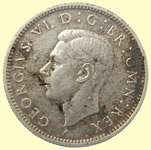 |
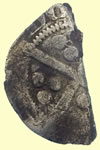  |
||||||||||||||
| 1939 George VI milled silver sixpence | Medieval hammered silver penny Obv CIVI/TAS/LON/DON |
||||||||||||||
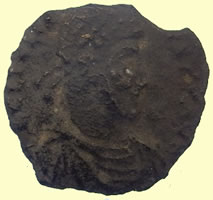 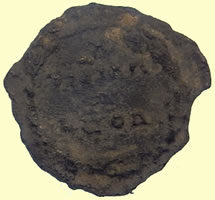 |
|||||||||||||||
4thC Roman silver coin sent for ID I cannot clean this coin as I just had another one break into 3 pieces - too thin and poor quality silver. This one is already fragmenting at the edges |
|||||||||||||||
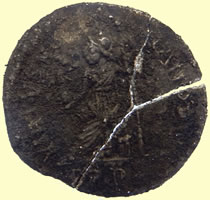 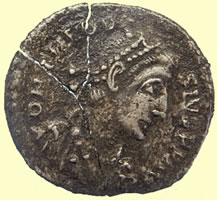 |
|||||||||||||||
Fascinating 4thC Roman silver find sent for ID - The structure of this coin under my scope is tiny silver granules very like the Saxon silver pennies that are too brittle to clean. Sent to Mark Lehman for his views. The last Saxon silver we sent we sent to our goldsmith for fixing came back in 8 pieces as it fell apart. This is more commonly seen in silver than in Æ's - although the occasional base-metal piece will have gone so granular as to become brittle and easily broken. It's one of the many things that can happen to coins during their long diagenesis. |
|||||||||||||||
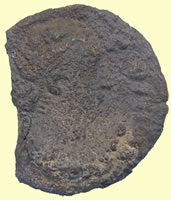 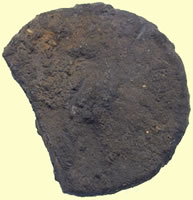 |
|||||||||||||||
| 2ndC Roman silver coin - needs a good cook to remove crust | |||||||||||||||
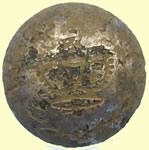 |
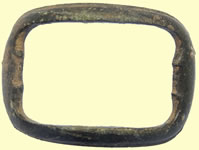 |
  |
|||||||||||||
| GPO button | Roman harness pendant | ||||||||||||||
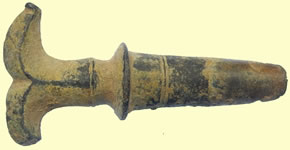 |
|
||||||||||||||
| Post medieval barrel tap | Heavy gold plated and decorated post medieval handle | ||||||||||||||
  |
  |
||||||||||||||
Medieval Edward hammered silver penny Obv +EDW**** |
1247 Henry III hammered silver voided long cross half penny Obv hENRICVS R** Rev /hEN/RIO - Moneyer Henri |
||||||||||||||
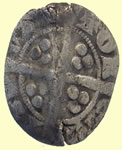 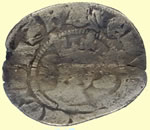 |
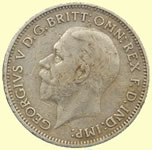 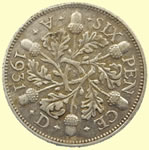 |
||||||||||||||
1279 Edward 1st hammered silver penny Obv EDWAR ANGL DNS YB Rev CIVI/TAS/CAN/TOR -Canterbury mint |
1931 George V milled silver sixpence | ||||||||||||||
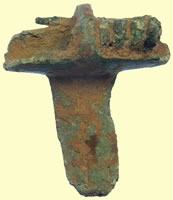 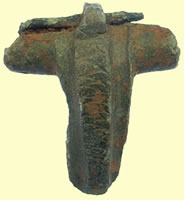 |
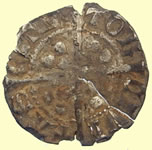 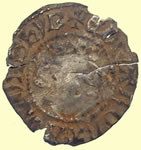 |
||||||||||||||
| 2ndC Roman fibular brooch | 1279 Edward 1st hammered silver penny - Class 10ab Obv EDWARD R ANGL DNS YB Rev CIVI/TAS/CAN/TOR -Canterbury mint |
||||||||||||||
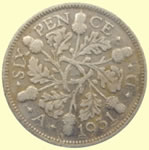 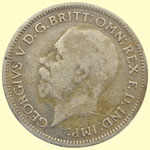 |
 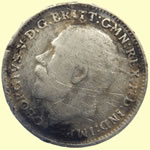 |
||||||||||||||
| 1931 George V milled silver six pence | 1916 George V milled silver three pence | ||||||||||||||
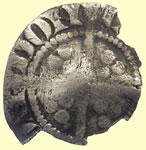 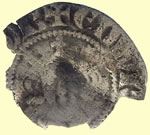 |
|||||||||||||||
1279 Edward 1st hammered silver penny - Class 10ab Obv EDWAR *** YB Rev CIVI/TAS/LON/DON - London mint |
1696 William III milled silver sixpence | ||||||||||||||
  |
 |
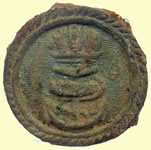 |
|||||||||||||
1586 Hans Krauwincel II Rose orb Jetton HANNS KRAVWINCKEL IN NVRENB |
1920's golf medallion | Foreign navy button | |||||||||||||
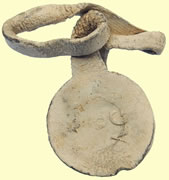 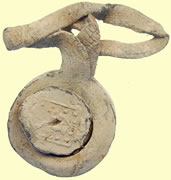 |
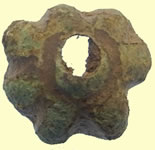 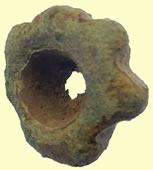 |
||||||||||||||
| Post medieval complete cloth seal | Medieval gilded mount | ||||||||||||||
  |
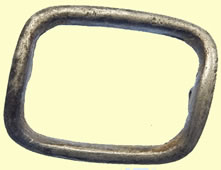 |
||||||||||||||
| Medieval gilded and decorated pendant | Georgian silver buckle | ||||||||||||||
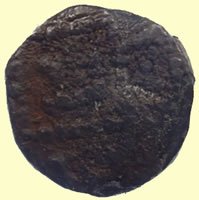 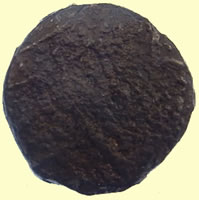 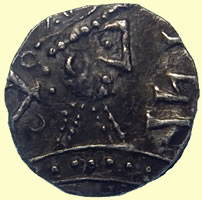 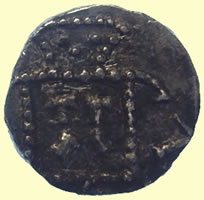 |
|||||||||||||||
Primary Saxon silver sceat 600- 700 AD - 'cooking' it to clean off crust Sent to Fitzswilliam museum for recording 1.27g, 12mm Many thanks for this new find, which I have recorded as EMC 2014.0289. |
|||||||||||||||
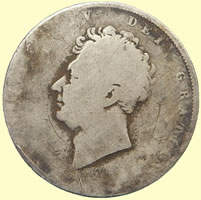 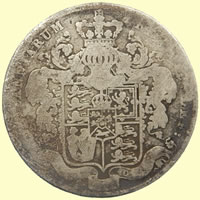 |
|||||||||||||||
| Huge 1820 -30 George IV milled silver half crown (30 pence) | |||||||||||||||
 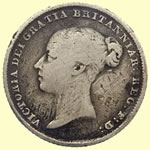 |
 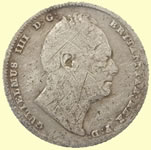 |
||||||||||||||
| 1840 Victoria milled silver sixpence | 1835 William IV milled silver sixpence | ||||||||||||||
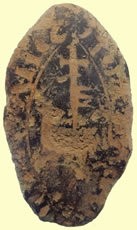 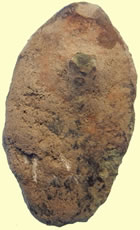 |
|||||||||||||||
| 13thC sacificial lamb type vessica seal matrix - soaking in distilled water to clean up legend | |||||||||||||||
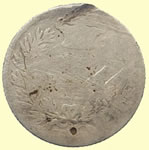 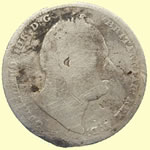 |
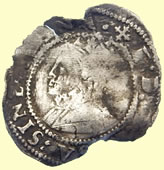 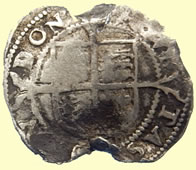 |
||||||||||||||
| 1835 William IV milled silver sixpence | 1560-1 Elizabeth 1st hammered silver half groat - Crosslet mint mark | ||||||||||||||
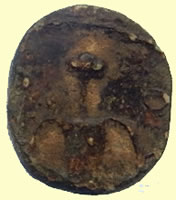 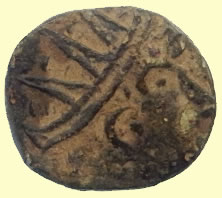 |
|||||||||||||||
A tiny sweet little Roman 4thC Barbarous radiate coin sent for ID Looks like ET on reverse !! 0.67mm,10mm A very nice example of the fully devolved form. Also, I know I've subjected you to my opinions on this subject before and although I know I'm unlikely to change the world which uses this terminology, but just to reiterate, "Barbarous Radiate" is a terribly incorrect and inappropriate name for contemporary copies of this nature. These contemporary copies were made and used by people who were not only no more barbarous than than those who made the originals which served as protype, they were made and used by the same people. Folks who are unaware of the difference in meaning between the words: "barbarous", "barbaric", "barbarian" (most people, these days, it appears) seem to have an opinion - or as a sales technique want to spread the erroneous perception - that coins of this nature were made and used by Conan of Cimmeria, or some similar scenario. In fact "barbarous" in this usage was meant as an artistic criticism of the style, made by the snobbish collectors of the 19th century whose artistic appreciation was so stunted that in their opinion anything other than standard Classical art was unworthy of their exalted notice. In fact, these changes in design are tracing a similar arc to those designs based originally on the staters of Philip II and Alexander which were the prototypes for hundreds of later types of Celtic staters. These morphed as they emphasized some parts of the design and left others out in accordance with their own artistic sensibilities. Mark
|
|||||||||||||||
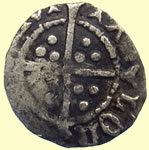 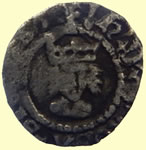 |
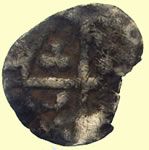 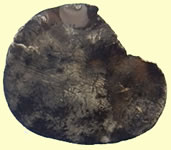 |
||||||||||||||
1485 Henry VII hammered silver half penny- Brush hair - single arched crown- im.Pheon Obv hENRIC DI GRA REX Rev CIVI/TAS/LON/DON - London mint |
Medieval hammered silver long cross half penny | ||||||||||||||
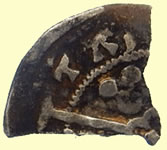 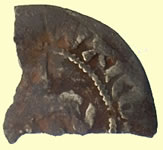 |
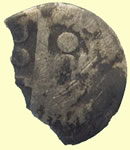 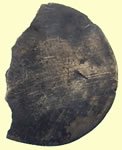 |
||||||||||||||
1279 Edward 1st hammered silver penny fragment Quatrefoil with pellet in reverse cross - York mint Obv *EDAR* Rev /TAS/ |
Medieval hammered silver long cross penny | ||||||||||||||
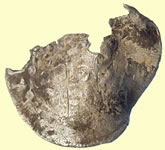 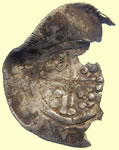 |
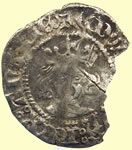 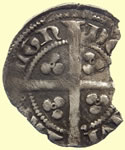 |
||||||||||||||
| 1216 Henry III hammered silver short cross penny | 1351 -61 Edward III hammered silver penny - Pre Treaty A , annulets in all quadrants of reverse pellets -legend stops annulets Obv +EDW** S o REX o ANGLIE Rev CIVI/TAS/LON/DON - London mint |
||||||||||||||
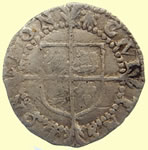 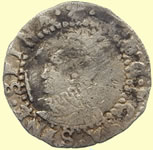 |
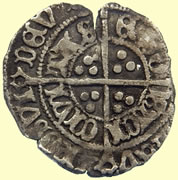 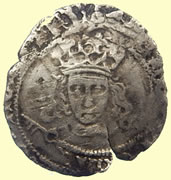 |
||||||||||||||
| 1584-6 Elizabeth 1st hammered silver penny - Escallop mint mark | Double struck 1485 Henry VII hammered silver half groat Archb Savage - keys by neck , no tressure:ornate lettering, mm martlet Rev CIVI/TAS/EBO/RACI - York mint |
||||||||||||||
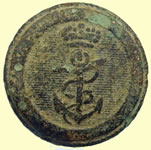 |
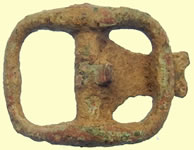 |
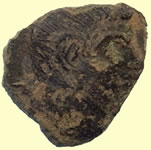 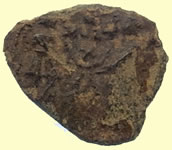 |
|||||||||||||
| RN Capt / Commander - 1812 | 1600- 1720 spur buckle | 4thC Roman bronze | |||||||||||||
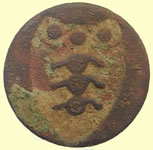 |
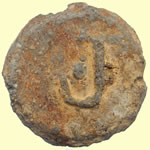 |
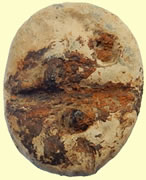 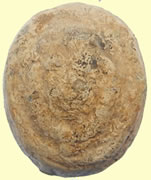 |
|||||||||||||
| 18thC Royal Artillery button | 17thC lead token | Victorian lead Lion head mount | |||||||||||||
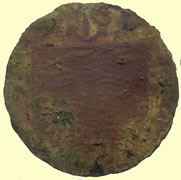 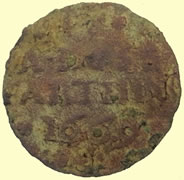 |
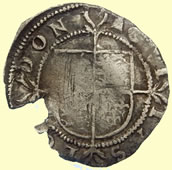 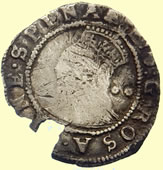 |
||||||||||||||
| 1669 hammered copper trade farthing | 1582-3 Elizabeth 1st hammered silver half groat - Bell mint mark | ||||||||||||||
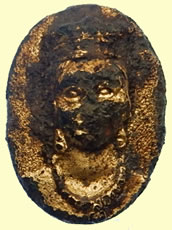 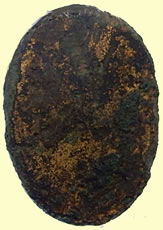 |
|||||||||||||||
Medieval gilded mount possibly from pendant ?? The decayed condition of the bronze suggests it is early but the head and ear rings suggest earlier Sent to museum for ID, could be Roman by the hairstyle and background work |
|||||||||||||||
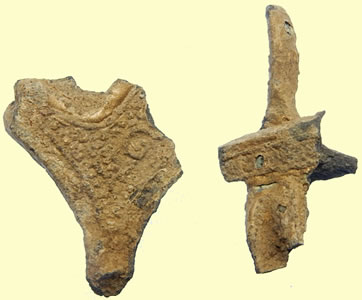 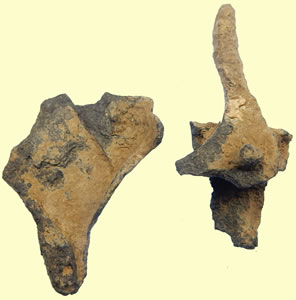 |
|||||||||||||||
| Early medieval gilded item on lead alloy base metal - sent to museum for ID | |||||||||||||||
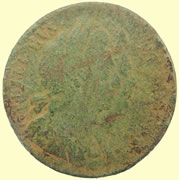 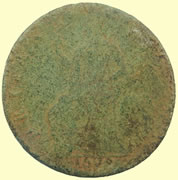 |
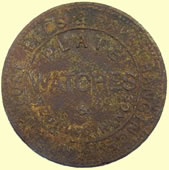 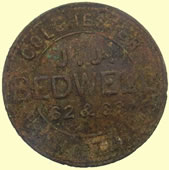 |
||||||||||||||
| 1697 William and Mary milled copper halfpenny | 19thC Colchester Bedwell token | ||||||||||||||
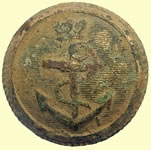 |
 |
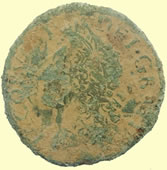 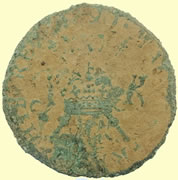 |
|||||||||||||
| RN Capt / Commander - 1812 | 19thC Customs button | 1690 James II Irish 'gun metal' emergency coinage Obv 1 - JACOBVS II DEI GRATIA - Rev 1 |
|||||||||||||
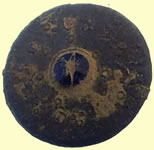 |
 |
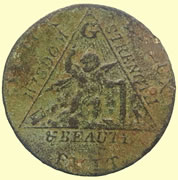 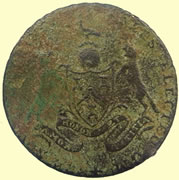 |
|||||||||||||
| Georgian button with blue glass stone | Unknown 18thC Royal Navy button | Masonic coin that was dated in 1790 This coin was made for the Prince of Wales when he was elected Grand Master of the Grand Lodge of England in 1790. It was minted by Brother James Scetchley, who was a printer, publisher, and auctioneer. Brothe Scetchley issued the first Birmingham Directory, published a book in 1790 on Freemasonry, and was a member of the “Twelve Apostles”. The obverse of the coin is stamped background with chevron and foreground with three pillars, compasses and square extending chevron wise, a dove on a wreath above a globe, two Castor Fiber, and the motto “Amor Honor et Justita” printed in a banner below the chevron. The legend around the edge is stamped, “24 NOV 1790 PRINCE OF WALES ELECTED GM.” The reverse of the coin has a cupid a midst Masonic emblems in a triangle. The outside of the triangle is stamped with the words “WISDOM STRENGTH & BEAUTY.” You’ll note this stamp is a different font. The legend around the edge is stamped “SIT LUX ET LUX FUIT.” |
|||||||||||||
|
|||||||||||||||
1801 silver spoon - London 1795 Duty paid mark Maker William Edwards |
|||||||||||||||
 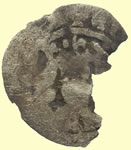 |
 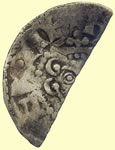 |
||||||||||||||
1279 Edward 1st hammered silver penny Obv +ED**** Rev BO/** York mint |
1247 Henry III hammered silver voided long-cross half penny | ||||||||||||||
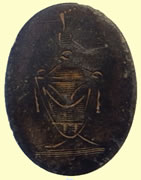 |
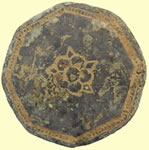 |
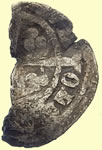  |
|||||||||||||
| Georgian cuff link | 18thC Royal navy button | Medieval hammered silver penny fragment | |||||||||||||
 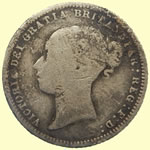 |
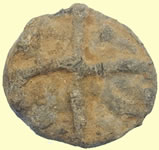 |
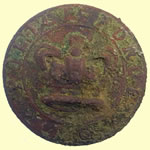 |
|||||||||||||
| 1871 Victoria milled silver sixpence | 15thC lead token - Type 2 | Police Force button | |||||||||||||
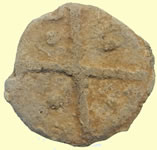 |
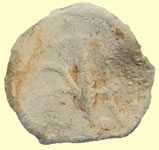 |
  |
|||||||||||||
| 15thC lead token - Type 2 | Medieval lead token | 1943 George V milled silver sixpence | |||||||||||||
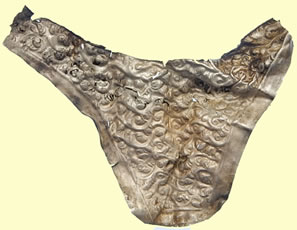 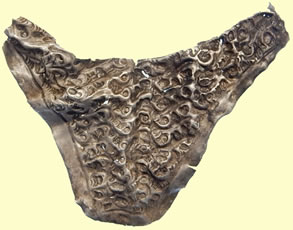 |
|||||||||||||||
Early silver scabbard decoration - not sure of date - reported to museum as treasure 2.18g, 53mm wide x 42mm high |
|||||||||||||||
 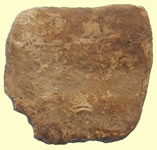 |
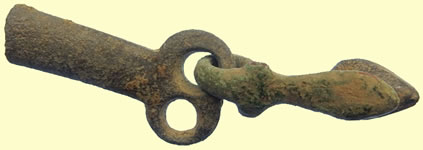 |
||||||||||||||
| Medieval lead weight | Georgian spur | ||||||||||||||
  |
 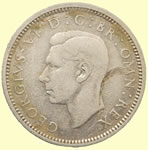 |
||||||||||||||
| 16thC Elizabeth hammered silver three pence | 1942 George V milled silver sixpence | ||||||||||||||
 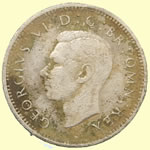 |
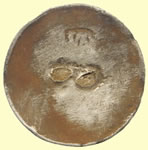 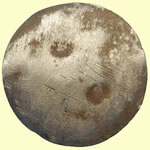 |
||||||||||||||
| 1945 George V milled silver sixpence | Georgian silver button | ||||||||||||||
  |
 |
||||||||||||||
| M<medieval long cross hammered silver penny fragment | Medieval book clasp | ||||||||||||||
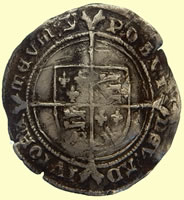 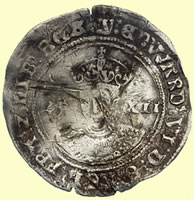 |
|||||||||||||||
1551-3 Edward VI hammered silver shilling (12 pence) - mint mark 'y' 5.68g, 33mm |
|||||||||||||||
 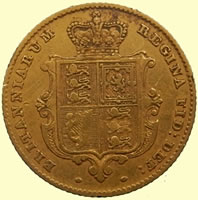 |
|||||||||||||||
1846 Victoria milled gold half sovereign 19.2mm,3.97g |
|||||||||||||||
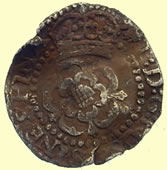 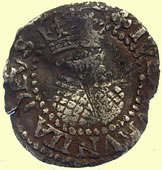 |
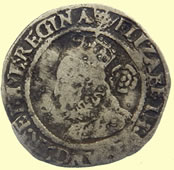 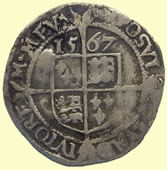 |
||||||||||||||
| 1613 James 1st hammered silver half groat - Trefoil mint mark | 1567 Elizabeth 1st hammered silver three pence | ||||||||||||||
  |
  |
||||||||||||||
| 1897 Victoria milled silver three pence | 1247 Henry III hammered silver voided long-cross half penny Obv hENRIC ** Rev ONL/VND - London mint |
||||||||||||||
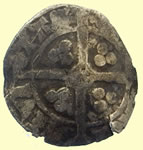 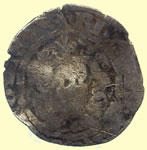 |
 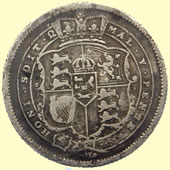 |
||||||||||||||
1377-99 Richard II hammered silver penny - Quatrefoil with pellet in reverse cross Obv RIC*** LIE Rev CIVI/TAS/EBO/RACI - York mint |
1817 George III milled silver shilling | ||||||||||||||
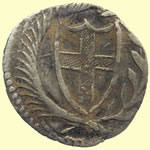 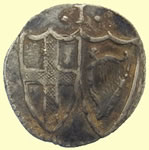 |
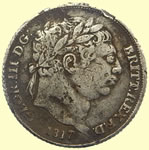 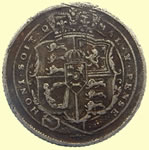 |
||||||||||||||
| 1649 Commonwealth hammered silver penny | 1817 George III milled silver sixpence | ||||||||||||||
 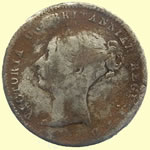 |
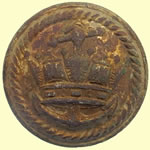 |
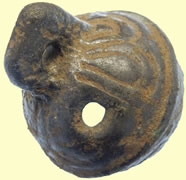 |
|||||||||||||
| 1862 Victoria milled silver three pence | Britain's Merchant Navy Bliss Bros Ltd Rd 665050 |
16thC crotal bell | |||||||||||||
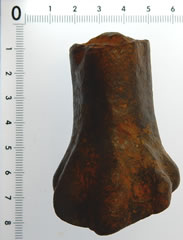 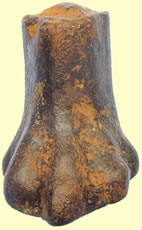 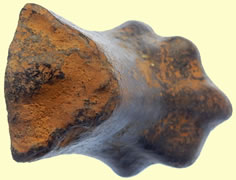 |
|||||||||||||||
| Monster sized medieval bronze pot leg | |||||||||||||||
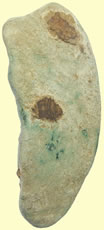  |
|||||||||||||||
| c 1000 BC Bronze age socketed axe fragment | |||||||||||||||
 |
 |
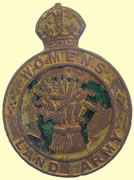 |
|||||||||||||
| General Post Office button | 18thC Royal artillery button | WWII Woman Land Army badge With the country at war and all able-bodied men needed to fight, there was a shortage of labour to work on farms and in other jobs on the land. At the same time it was becoming increasingly difficult to get food imported from abroad, so more land needed to be farmed to provide homegrown food. The Women's Land Army provided much of the labour force to work this land. |
|||||||||||||
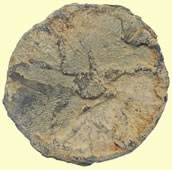 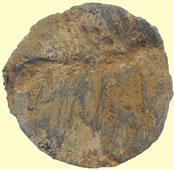 |
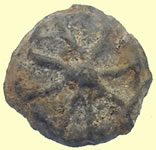 |
 |
|||||||||||||
| Unusually large 17th lead token | 17th lead token | 17thC clothing fastener | |||||||||||||
 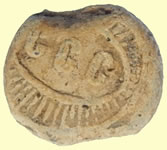 |
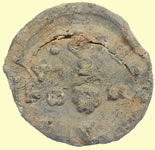 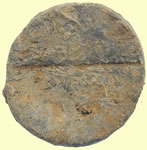 |
||||||||||||||
| Post medieval lead bale seal | Post medieval lead bale seal | ||||||||||||||
  |
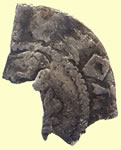 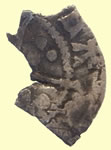 |
||||||||||||||
Medieval hammered silver long cross penny Rev CIVI/TAS/EBOR/ACI - York mint |
1427-30 Henry VI hammered silver penny fragment - mascles in obverse legend Obv *LA/C - Calais mint |
||||||||||||||
First cut qtr Tealby we have ever found 1158 -1189 AD Henry II hammered silver farthing ' Tealby' cross and crosslet type Sent to Fitzwilliam museum for recording The Tealby cut quarter is EMC 2015.0294. 10.1mm ,0.35g |
|||||||||||||||
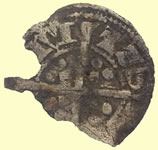 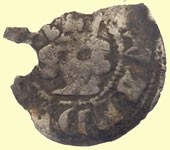 |
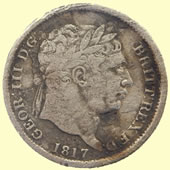 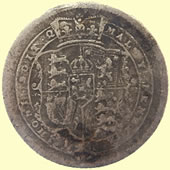 |
||||||||||||||
Medieval Edward 1st to 3rd hammered silver half penny Obv *WARD** Rev CIVI/TAS/*** |
1817 George III milled silver shilling | ||||||||||||||
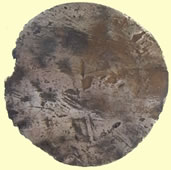 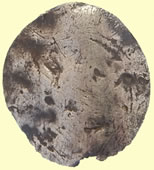 |
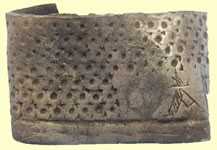 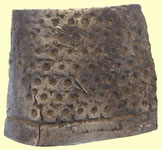 |
||||||||||||||
| 16thC Elizabeth 1st hammered silver three pence | Georgian open topped silver thimble fragments - initialed | ||||||||||||||
  |
 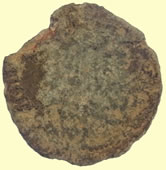 |
||||||||||||||
| 2ndC Roman fibular brooch | Mid 4thC Roman barbarous radiate bronze coin | ||||||||||||||
  |
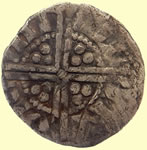 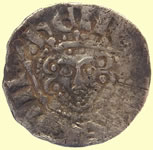 |
||||||||||||||
1247 Henry III hammered silver voided long-cross penny - Class IIIb Obv hENRICVS REX III Rev NIC/OLE/ONL/VND - Moneyer Nicole of London mint |
1247 Henry III hammered silver voided long-cross penny - Class Vc Obv hENRICVS REX III |
||||||||||||||
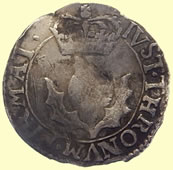 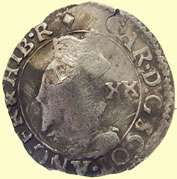 |
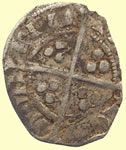 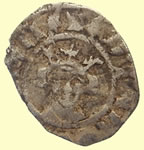 |
||||||||||||||
| 1625 Scottish Charles 1st hammered silver twenty pence | 1300-10 Edward II hammered silver farthing- new issue with inner circles both sides - oval flan - Type 28f Obv EDWARDVS REX AN Rev CIVI/TAS/LON/DON - London mint |
||||||||||||||
|
  |
||||||||||||||
| 18thC bayonet frog | 1205 - 1230 AD William 1st The Lion of Scotland short cross hammered silver half penny. obv LEI REI WILAM rev HENRI LE RVS .ON.RORE |
||||||||||||||
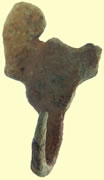 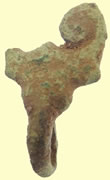 |
  |
||||||||||||||
| 16thC Tudor clothing fastener | 1920 George V milled silver shilling | ||||||||||||||
 |
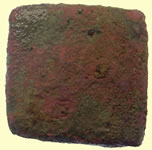 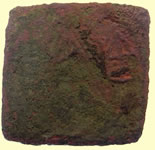 |
||||||||||||||
| Napoleonic wars lead figurine of Napoleon | 1587 Rose Ryal coin weight | ||||||||||||||
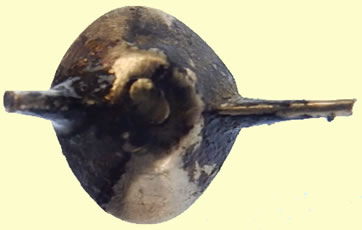 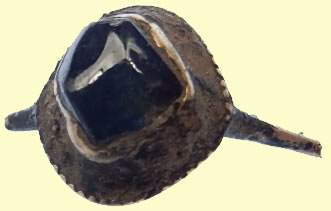 |
|||||||||||||||
Medieval green stone gold ring - reported to museum as treasure 0.61g,12.5mm Cannot clean off the black tar substance sticking to it as it has to be handed in uncleaned as a treasure item. |
|||||||||||||||
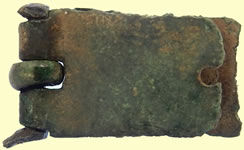  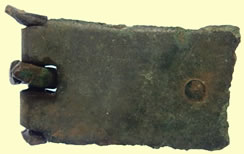 |
|||||||||||||||
| Medeival buckle plate | |||||||||||||||
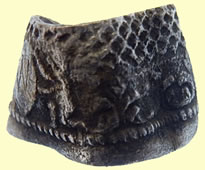 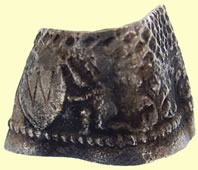 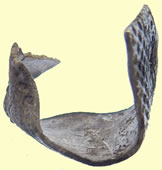 |
|||||||||||||||
| Georgian silver open topped decorated thimble - W in cartouche | |||||||||||||||
|
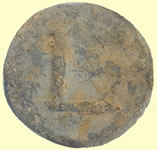 |
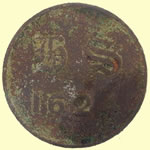 |
|||||||||||||
| 1500-1700 mount | 17thC lead token | Curious 19thC livery button with number | |||||||||||||
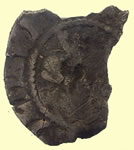 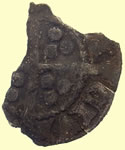 |
|||||||||||||||
Medieval hammered silver long cross penny Obv ***GL DNS** Rev CIVI/*** |
1697 William III milled silver shilling | ||||||||||||||
 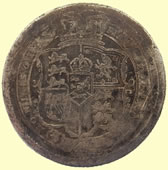 |
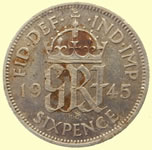 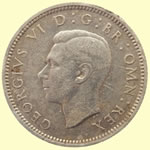 |
||||||||||||||
| 1816 George III milled silver shilling | 1945 George VI milled silver sixpence | ||||||||||||||
 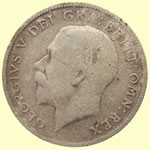 |
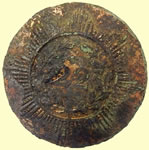 |
 |
|||||||||||||
| 1921 George V milled silver sixpence | Our first ever 22nd Regiment of foot button Officer - 1830-1855 The 22nd Regiment of Foot was raised by the Duke of Norfolk in 1689 and was able to boast an independent existence of over 300 years. |
1820 -1836 Royal Navy Customs button | |||||||||||||
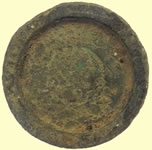 |
 |
  |
|||||||||||||
| Georgian trade weight | Victorian Royal Artillery button | 1216 Henry III hammered silver short cross penny fragment | |||||||||||||
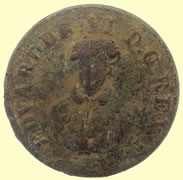 |
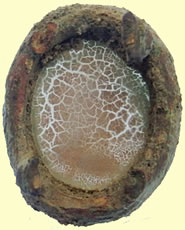 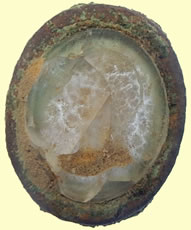 |
||||||||||||||
Curious button - clearly marked EDWARDUS VI D.G.REX with the Kings profile implying a date of 1461-1483 but the construction is 19thC
|
Georgian fob seal - bust facing left | ||||||||||||||
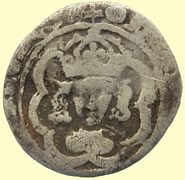 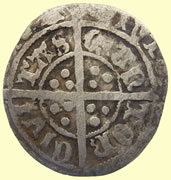 |
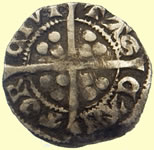 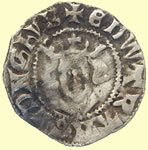 |
||||||||||||||
1483-5 Henry VII hammered silver half groat - double arched jeweled- Tun mint mark CIVI/TAS/CAN/TOR - Canterbury mint |
1279 Edward 1st hammered silver penny Obv EDWAR ANGL DNS hYB Rev CIVI/TAS/CAN/TOR -Canterbury mint |
||||||||||||||
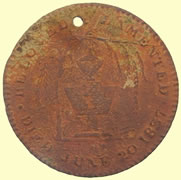 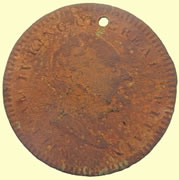 |
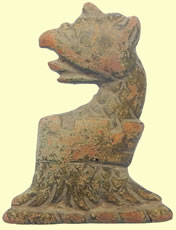 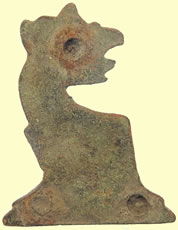 |
||||||||||||||
William IV King of Great Britain Beloved lamented died 20th June 1857 |
Post medieval griffin mount | ||||||||||||||
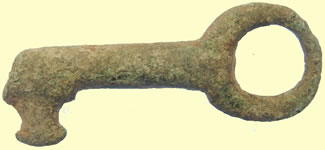 |
 |
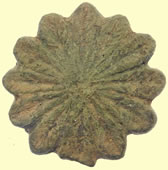 |
|||||||||||||
| 15thC casket key | Georgian watch winder | 1500-1700 mount | |||||||||||||
  |
|||||||||||||||
| 1939 George VI milled silver sixpence | 1696 William III milled silver shilling | ||||||||||||||
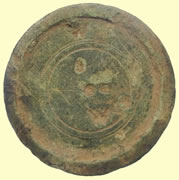 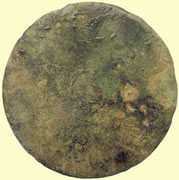 |
  |
||||||||||||||
| 17thC William III trade weight - 'W' markings | 1280 - 1286 Alexander III Scottish hammered silver penny - 2nd Coinage Stars have 6 points Ref SA3HD-005 Obv ALEXANDER DEI GRA |
||||||||||||||
  |
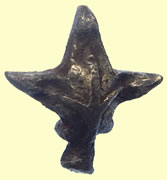  |
||||||||||||||
1280 Edward Ist hammered silver farthing - Type 10 - bust to edge of flan Obv +ER ***ANGLIE Rev LON/DON/IEN/SIS London mint |
Medieval gilded silver mount - reported to museum as treasure | ||||||||||||||
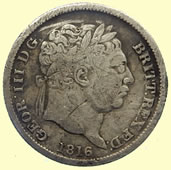 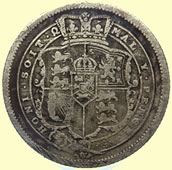 |
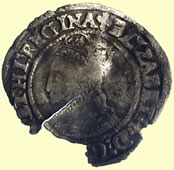 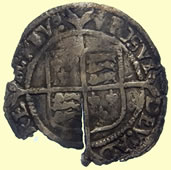 |
||||||||||||||
| 1816 George III milled silver shilling | 1561-5 Elizabeth 1st hammered silver three pence - Pheon mint mark | ||||||||||||||
 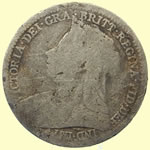 |
  |
||||||||||||||
| 1901 Victoria milled silver three pence | 1158 -1189 AD Henry II hammered silver half penny ' Tealby' cross and crosslet type | ||||||||||||||
1640's English civil war cannon ball - 18 pounder sized - solid iron balls used in strands of grape 59mm dia, 1.96lbs |
|||||||||||||||
  |
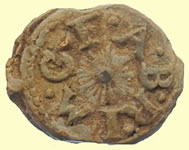 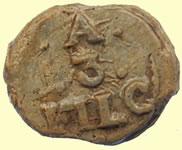 |
||||||||||||||
1199 John hammered silver short cross half penny - Class 5 Obv hE Rev CA+CO - Moneyer Coldwine of Canterbury mint |
Post medieval lead bale seal | ||||||||||||||
 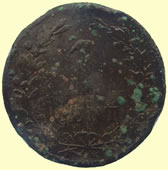 |
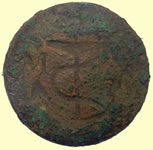 |
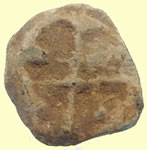 |
|||||||||||||
| 1878 Dutch 1 cent copper coin | Capt / Commander - 1774-1787 | 15thC lead token | |||||||||||||
 |
 |
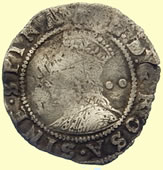 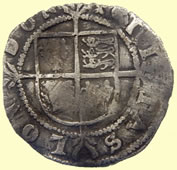 |
|||||||||||||
Generic Merchant Navy Officers In use 1900 's onwards |
18thC Royal Artillery button | 1572-3 Elizabeth 1st hammered silver half groat - Ermine mint mark | |||||||||||||
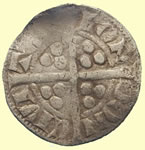 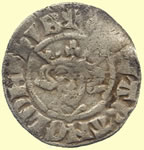 |
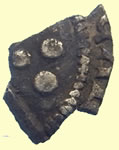 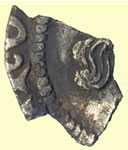 |
||||||||||||||
1279 Edward 1st hammered silver penny Obv EDWAR ANGL DNS hYB Rev CIVI/TAS/LON/DON - London mint |
Medieval hammered silver half penny fragment | ||||||||||||||
 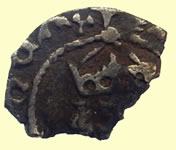 |
 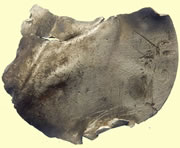 |
||||||||||||||
1464- 70 Edward IV hammered silver half penny - single arched crown - trefoil stop after REX - Long cross fitchee Obv E**** REX (trefoil stop) Rev CIVI/TAS/*** |
1553 Mary hammered silver groat | ||||||||||||||
  |
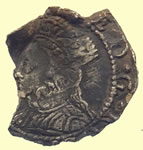 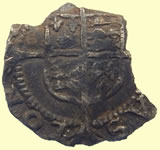 |
||||||||||||||
| Venetian Soldino issued by Doge Michele Steno (1400-1413). Obv: MICHAEL STEN' DVX (Michele Steno, Doge). Doge standing left, holding standard. Rev: S MARCVS VENETI (Saint Mark of Venice). Winged and nimbate lion of Saint Mark facing. |
16thC Elizabeth 1st hammered silver penny | ||||||||||||||
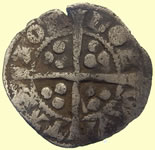 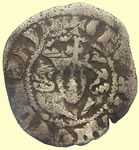 |
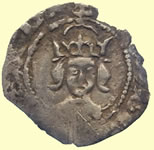 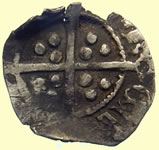 |
||||||||||||||
1279 Edward 1st hammered silver penny Obv EDWAR ANGL DNS hYB Rev CIVI/TAS/LON/DON - London mint |
1485- 1509 Henry VII hammered silver half penny -single arched crown, long cross fourchee, wide hair Rev AS/CA - Canterbury mint |
||||||||||||||
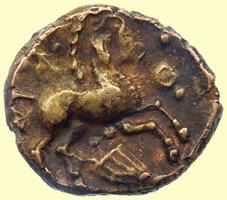 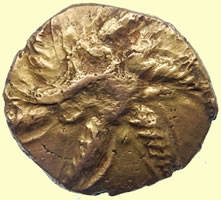 |
|||||||||||||||
45 BC Addedomarus Celtic gold stater - reported as hoard to museum 5.57g, 18.2mm |
|||||||||||||||
 |
 |
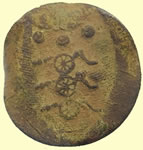 |
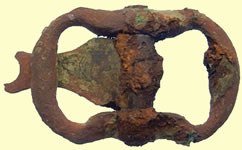 |
||||||||||||
| 18thC silver Royal Navy button | 19thC Customs button | 18thC Royal Artillery button | Georgian spur buckle | ||||||||||||
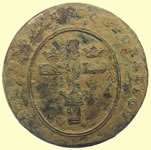 |
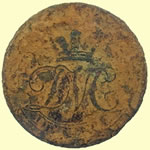 |
|
|||||||||||||
| 19thC Colchester corporation button | 1797- 1803 Defense Volunteer Cavalry Raised in consequence of the fears of invasion by Napoleon in July, 1803. Similar to Tendring Volunteer Cav |
Medieval goilded and decorated purse bar end | |||||||||||||
 |
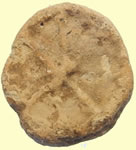 |
  |
|||||||||||||
| Georgian watch winder | 15thC lead token | 2000 BC Bronze Age British flat axe fragment | |||||||||||||
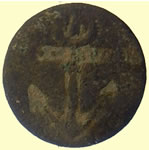 |
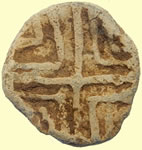 |
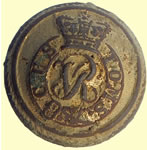 |
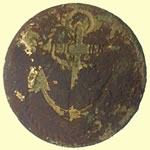 |
||||||||||||
| Capt / Commander - 1774-1787 | 17thC lead token | Victoria Navy Customs button | Capt / Commander - 1774-1787 | ||||||||||||
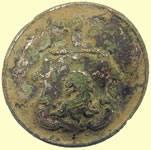 |
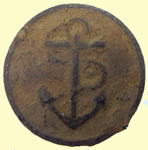 |
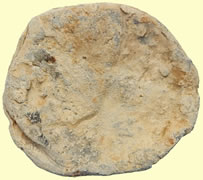 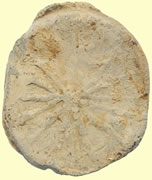 |
|||||||||||||
| 19thC livery button | Capt / Commander - 1774-1787 | Medieval lead trade weight | |||||||||||||
 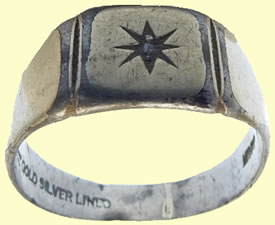 |
|||||||||||||||
| 20thC 9 carat gold on silver lined ring | |||||||||||||||
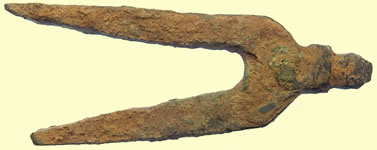 |
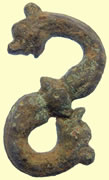 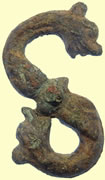 |
||||||||||||||
| Medieval knopped strap end | Medieval S buckle | ||||||||||||||
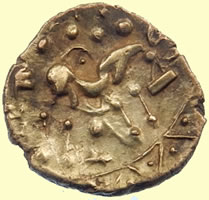 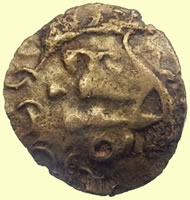 |
|||||||||||||||
Trinovantes British G “Clacton” quarter, Hobbs 192 Celtic gold 1/4 stater 50BC Chris Rudd 23.41 Clacton de Jersey - Classed as scarce 1.47g,14.2mm Reported as hoard addendum to museum |
|||||||||||||||
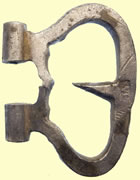 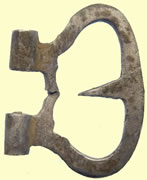 |
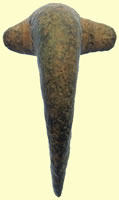  |
||||||||||||||
| 1751-55 Silver buckle - Possibly William Justis the maker | 2ndC Roman fibular brooch | ||||||||||||||
 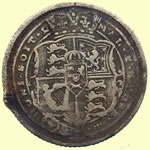 |
  |
||||||||||||||
| 1819 George III milled silver sixpence | 1296-97 Edward 1st Jetton Class 11 to 15 Obv Hexagon containing rose (5 petals) border, pellets Rev Short cross Moline , pellet in each angle:border pellets Ref Mitchiner 230 |
||||||||||||||
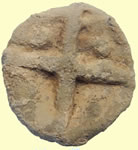 |
 |
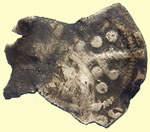 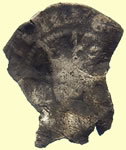 |
|||||||||||||
| 15thC lead token - type 2 | 20thC Swimming Association - silver standard badge | 1279 Edward 1st hammered silver penny Obv ED*** hYB Rev **VI/TAS/** |
|||||||||||||
 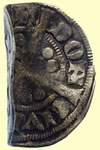 |
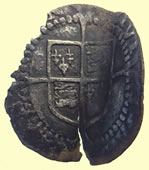 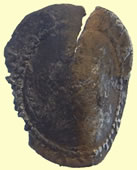 |
||||||||||||||
1279 Edward 1st hammered silver penny Obv EDWR R ANGL DNS hYB Rev CIVI/TAS/LON/DON - London mint |
16thC Elizabeth 1st hammered silver half groat | ||||||||||||||
  |
  |
||||||||||||||
1327 Edward III hammered silver penny Obv + E***NGLI Rev CIVI/TAS/*** |
1327 Edward III hammered silver penny Obv **DWARDVS ** Rev LON/DON - London mint |
||||||||||||||
|
|||||||||||||||
| Medieval decorated buckle plate | |||||||||||||||
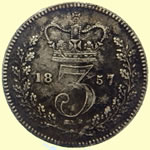 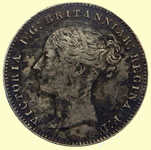 |
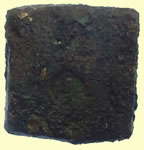 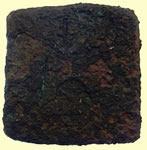 |
||||||||||||||
| 1857 Victoria milled silver three pence | 18thC bullion weight - Lion mark | ||||||||||||||
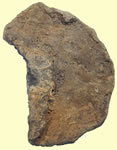 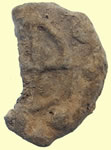 |
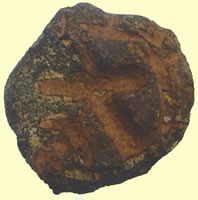 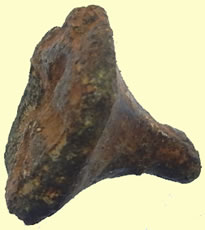 |
||||||||||||||
| Medieval lead Boy Bishop token | Medieval seal matrix | ||||||||||||||
|
|||||||||||||||
| Medieval scissor arm | |||||||||||||||
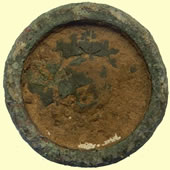 |
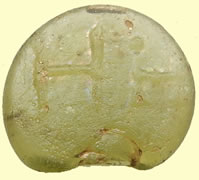 |
 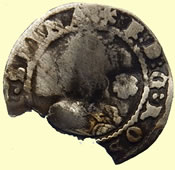 |
|||||||||||||
| 1830's London guildhall trade weight | 17thC glass bottle seal | 1575 Elizabeth 1st hammered silver half groat | |||||||||||||
 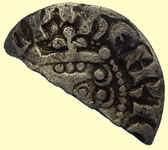 |
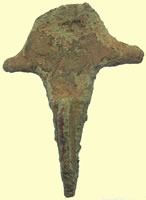 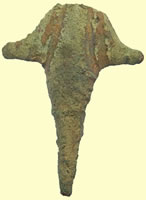 |
||||||||||||||
1247 Henry III hammered silver voided long cross half penny Obv +hENRIC ** Rev ONL/VND - London mint |
2ndC Roman enamelled fibular brooch | ||||||||||||||
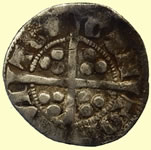 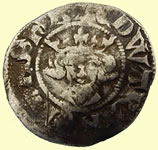 |
  |
||||||||||||||
1279 Edward 1st hammered silver penny Obv EDWAR ANGL DNS hYB Rev CIVI/TAS/CAN/TOR Canterbury mint |
1350- 1550 Florin coin weight - Low countries | ||||||||||||||
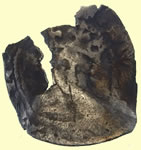 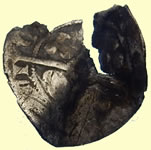 |
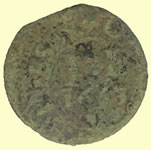 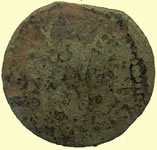 |
||||||||||||||
| 1279 Edward 1st hammered silver penny | 1653 Jeremy Erds of Manningtree Essex hammered copper trade farthing Obv I.E 1653 |
||||||||||||||
 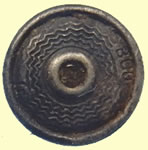 |
 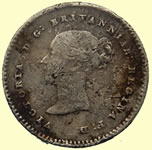 |
||||||||||||||
| Victorian silver stud | 1838 Victoria milled silver tow pence | ||||||||||||||
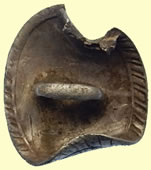 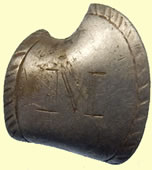 |
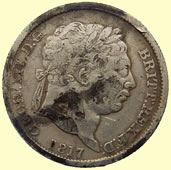 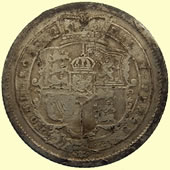 |
||||||||||||||
| Georgian silver cufflink - intial 'M' | 1817 George III milled silver shilling | ||||||||||||||
 |
 |
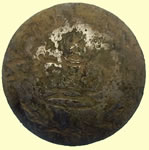 |
|||||||||||||
| 15thC casket key | Medieval button | Royal mail ? | |||||||||||||
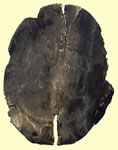 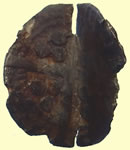 |
  |
||||||||||||||
| Medieval hammered silver long cross penny | 1199 John hammmed silver short cross half penny - Class 5 Obv RICVS R** Revv +AB - Monyer Abel of London |
||||||||||||||
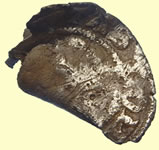 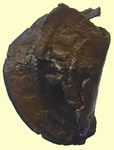 |
  |
||||||||||||||
1327 Edward III hammered silver penny Obv **ARDVS REX Rev TAS/LON/ - London mint |
1247 Henry III hammered silver voided long cross half penny Rev/NLV - London mint |
||||||||||||||
 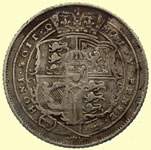 |
|||||||||||||||
| 1818 George III milled silver six pence | 1696 William III milled silver shilling | ||||||||||||||
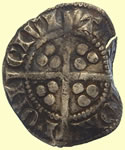 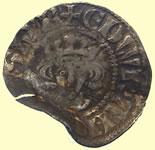 |
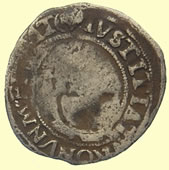 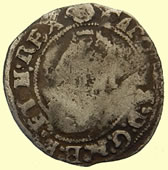 |
||||||||||||||
1279 Edward 1st hammered silver penny Obv EDWR ANGL DNS hYB Rev CIVI/TAS/LON/DON - London mint |
1631-2 Charles 1st hammered silver half groat - Rose mint mark | ||||||||||||||
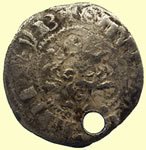 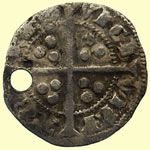 |
|||||||||||||||
1296- 1318 Edward 1st hammered silver penny - Type 1 Obv EDWAR ANGL DNS hYB Rev VILL/ABE/REV/VICI Berwick-Upon-Tweed mint
|
|||||||||||||||
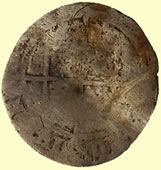 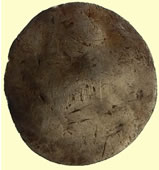 |
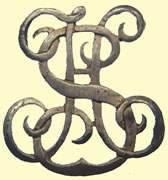 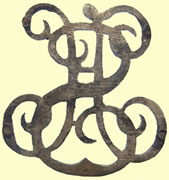 |
||||||||||||||
| 16thC Elizabeth hammerd silver half groat | Victorian silver name badge - JHS | ||||||||||||||
 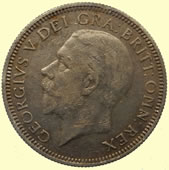 |
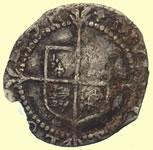 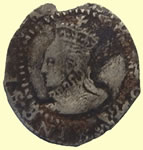 |
||||||||||||||
| 1934 George V milled silver shilling | 1578-9 Elizabeth 1st hammered silver penny - Greek cross mint mark | ||||||||||||||
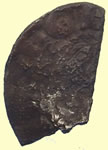  |
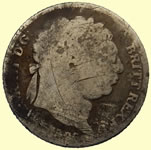 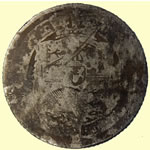 |
||||||||||||||
Medieval hammered silver long cross half penny Obv ** NGL
|
1816 George III milled silver sixpence | ||||||||||||||
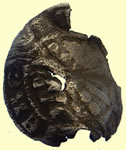 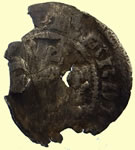 |
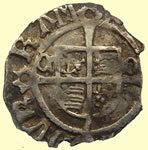 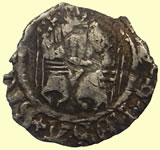 |
||||||||||||||
1279 Edward 1st hammered silver penny Obv ***WARDV ** Rev EBO - York mint |
1526 - 1544 Henry VIII hammered silver sovereign penny - Star both sides, radiant star Obv only CD besides shield - Bishop Cuthbert Tunstall |
||||||||||||||
  |
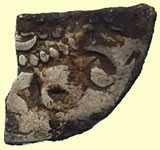 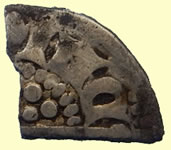 |
||||||||||||||
1377- 1399 Richard II hammered silver half penny penny Obv +RICARDVS.REX *** Rev CIVI/TAS/LON/DON London mint |
1247 Henry III hammered silver voided longcross farthing Rev /INC/ - Lincoln mint |
||||||||||||||
|
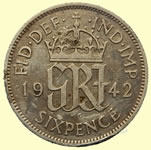 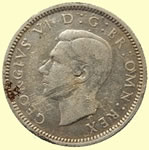 |
||||||||||||||
| Roman decorated helmet trim | 1942 George VI milled silvcer sixpence | ||||||||||||||
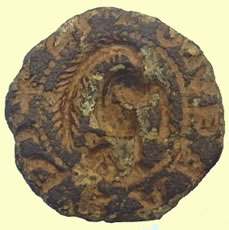 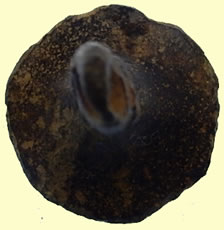 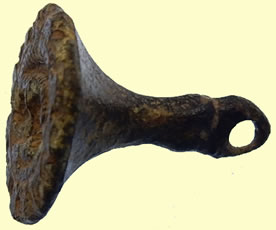 |
|||||||||||||||
| Medieval seal matrix | |||||||||||||||
 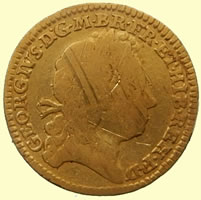 |
|||||||||||||||
1719 George 1st milled gold half guinea 3.97g, 21mm |
|||||||||||||||
1713 Queen Anne milled gold full guinea 24.2 mm,7.67g |
|||||||||||||||
  |
 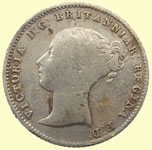 |
||||||||||||||
1485 Henry VII hammered silver halfpenny - rev cross fourchee - wide hair bust - Type 3 single arched crown Obv HENRIC DI GRA REX A Rev CIVI/TAS/LON/DON - London mint
|
1855 Victoria milled silver four pence | ||||||||||||||
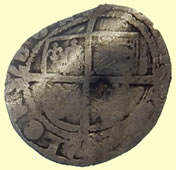 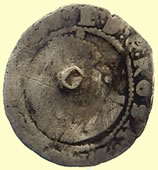 |
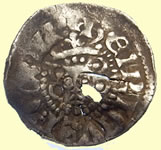 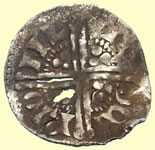 |
||||||||||||||
| 16thC Elizabeth 1st hammered silver half groat | 1247 Henry III hammered silver voided long cross penny Obv HENRICVS REX III Rev HEN/RIO/NL/VND - Moneyer Henri of London mint |
||||||||||||||
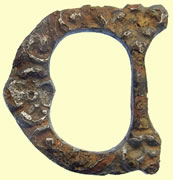 |
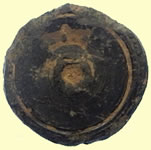 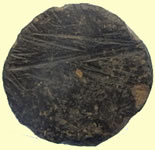 |
||||||||||||||
| 1500-1650 silvered buckle | 1421 crown (incuse) Uniface coin weight |
||||||||||||||
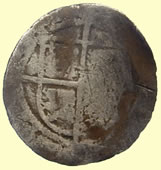 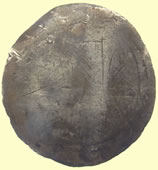 |
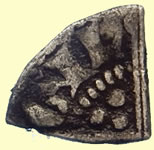 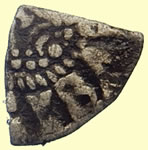 |
||||||||||||||
| 16thC Elizabeth 1st hammered silver half groat | 1247 Henry III hammered silver voided long cross farthing Rev ONL - London mint |
||||||||||||||
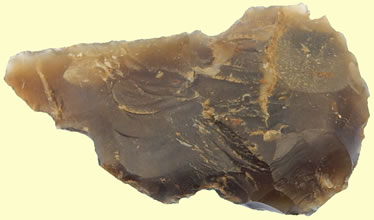 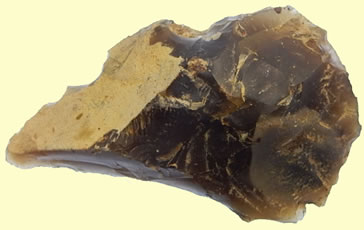 |
|||||||||||||||
| 11000 BC Stone Age flint scraper | |||||||||||||||
  |
  |
||||||||||||||
| Medieval hammered silver farthing | 1625 Charles 1st hammered silver penny | ||||||||||||||
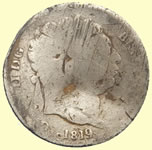 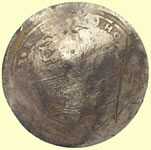 |
 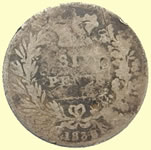 |
||||||||||||||
| 1819 George III milled silver sixpence | 1838 Victoria milled silver sixpence | ||||||||||||||
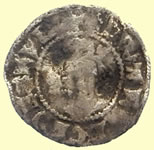 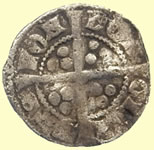 |
 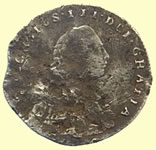 |
||||||||||||||
1279 Edward 1st hammered silver penny Obv EDWAR ANGL DNS hYB Rev CIVI/TAS/LON/DON - London mint |
1781 George III milled silver penny | ||||||||||||||
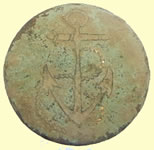 |
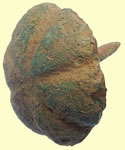 |
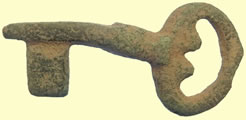 |
|||||||||||||
| Capt / Commander - 1774-1787 | 1500-1700 mount | 15thC casket key | |||||||||||||
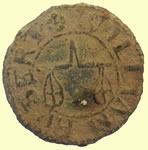 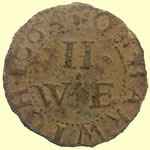 |
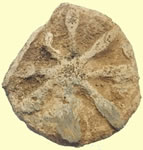 |
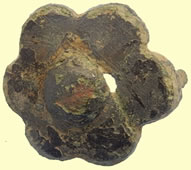 |
|||||||||||||
| 1664 William Herbert of Harwich Essex hammered copper trade farthing | 15thC lead token | 1500-1700 mount | |||||||||||||
 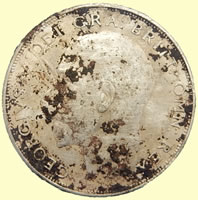 |
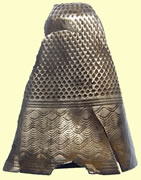 |
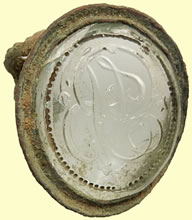 |
|||||||||||||
| 1926 George V milled silver half crown (30 pence) | Georgian silver decorated thimble | Neat glass faced Georgian fob seal | |||||||||||||
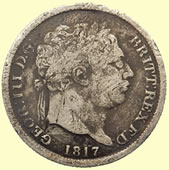 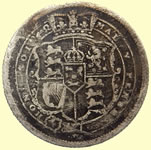 |
|||||||||||||||
| 1817 George III milled silver shilling | 1697 William III milled silver sixpence | ||||||||||||||
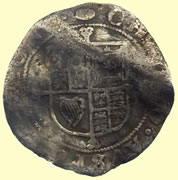 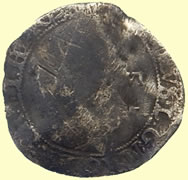 |
|||||||||||||||
| 1697 William III milled silver sixpence | 1638-9 Charles 1st hammered silver sixpence - Tun mint mark | ||||||||||||||
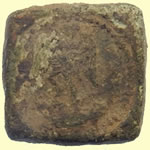 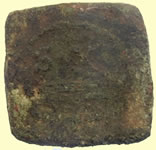 |
|||||||||||||||
| 15thC Angel coin coin weight - bent left leg Circa 1493 - British | 1693 William and Mary milled copper half penny | ||||||||||||||
|
|||||||||||||||
| 17thC decorated copper finger ring | |||||||||||||||
Beauty 2ndC Roman silver coin sent to Mark Lehman for ID This is, of course, Hadrian - I'd be surprised if you couldn't recognize him by his portrait - Although part of the obverse legend is off-flan, it's HADRIANVS AVG COS III P P. This is an issue from 137 AD (very late in his reign) from the mint at Rome. References would be RIC II 256; RSC 965 and SRCV 3507. Mark |
|||||||||||||||
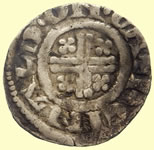 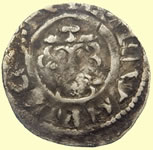 |
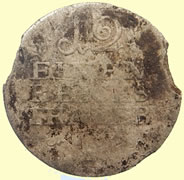 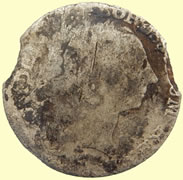 |
||||||||||||||
1189 Richard 1st hammered silver short cross penny - Class 3 Obv hENRICVS REX Rev + REINALD.ON.CA- Moneyer Reinald of Canterbury mint |
18thC German Prussia states continental billion silver coin -1/12 Thaler 1740-1786 Friedrich II Inscription ObverseHead of Friedrich II to the right, FRIDERICUS BORUSSORUM REX Inscription Reverse12 between rosettes, EINEN REICHS THALER year, bottom A between rosettes.
|
||||||||||||||
 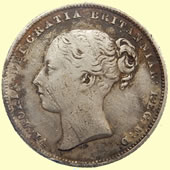 |
 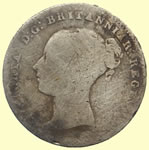 |
||||||||||||||
| 1864 Victoria milled silver shilling | 1856 Victoria milled silver sixpence | ||||||||||||||
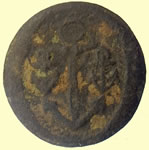 |
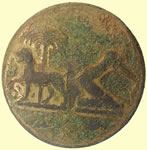 |
 |
|||||||||||||
| RN Master - 1807-1825 RN Ass't Master - 1807-1825 RN Volunteer Gr.II - 1824-1825 In use 1807 - 1825 |
19thC livery button | 18thC Miniature toy cannon | |||||||||||||
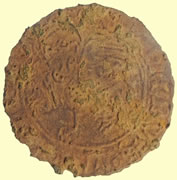 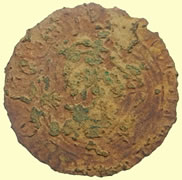 |
 |
||||||||||||||
1553- 86 AD Hans Schultes I ‘Lion of St Mark’ Jetton obv Lion of St mark standing left, nimbate and winged, holding book of the Gospels in right fore paw: Lions halo orjecting into the margin and surmounted by a cross + SANT:MARGVS:NORPED Rev Imperial orb surmouned by cross patty HANS rosette SCHVTLTES rosette NORNBE Ref Mitchiner 1382
|
18thC toy cannon | ||||||||||||||
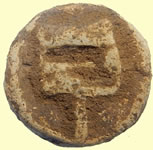 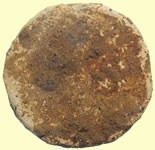 |
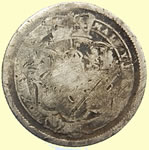 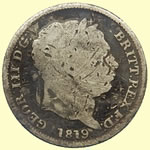 |
||||||||||||||
| Early medieval lead token | 1819 George III milled silver sixpence | ||||||||||||||
 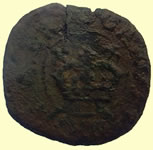 |
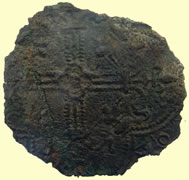 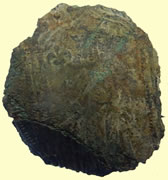 |
||||||||||||||
| 1634 Charles 1st hammered copper rose farthing | The Standing King series Charles IV 1322-28 French Jetton Obv 'king with sceptre standing beneath a gothic canopy' |
||||||||||||||
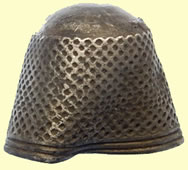 |
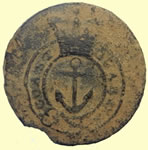 |
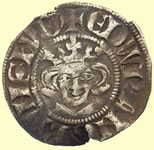 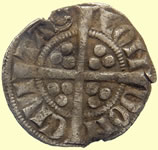 |
|||||||||||||
| Georgian silver thimble | 19thC coast guard button | 1282 - 9 Edward 1st hammered silver penny - egg waisted S, trifoliate crown - Class 4 Obv EDWR 'ANGL DNS hYB Rev CIVI/TAS/LON/DON - London mint |
|||||||||||||
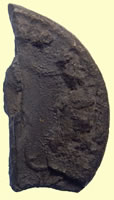 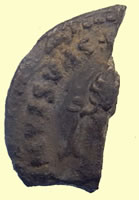 |
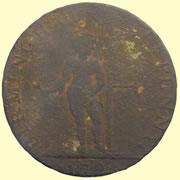 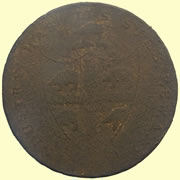 |
||||||||||||||
2ndC Roman silver coin fragment sent to Mark Lehman for ID The fragmentary denarius is either Vespasian or Titus as Caesar, 69-79 AD. (they both used the full name "[...V] ESPASIAN [VS...? AVG...? DIVI F...?]" in counter-clockwise legends on denarii.) That's exactly all that is legible on the fragment - lucky for us because it contains a lot more useful specific information than we could have otherwise hoped for on such a tiny fragment. |
Hardy’s Birmingham (Warwickshire) copper Conder halfpenny token dated 1793. Obverse: Figure of boy with spanner in hand standing by large auger: “BIRMINGHAM HALFPENNY 1793”. Reverse: The arms of the Hardy family consisting of a shield with four hedgehogs and a hedgehog crest: “INDUSTRY HAS IT’S SURE REWARD”. Edge inscription: “CURRENT EVERY WHERE”. | ||||||||||||||
Medieval decorated strap end |
|||||||||||||||
|
|||||||||||||||
Medieval gold ring with black sapphire pushed inside - reported as treasure to museum 22mm, 2.98g |
|||||||||||||||
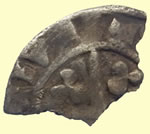 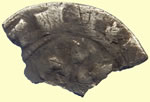 |
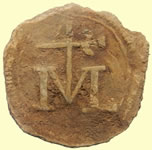 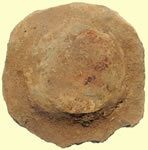 |
||||||||||||||
| Medieval hammered silver half pence | Post medieval lead cloth seal | ||||||||||||||
 |
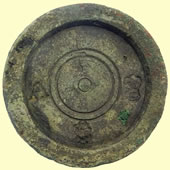 |
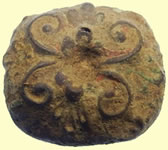 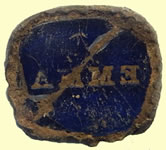 |
|||||||||||||
| 18thC Rpyal Artillery button | George II trade weight - Crown G London | Georgian fob seal - 'EMMA' | |||||||||||||
 |
  |
||||||||||||||
| 15thC lead token - type 2 | Facinating half penny double struck with long cross both sides. Edward hammered silver half penny - London mint Obv **DVS REX ** Rev /LON |
||||||||||||||
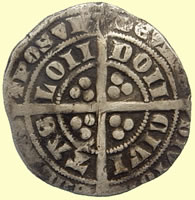 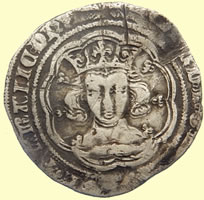 |
|||||||||||||||
1356-1361 Edward III hammered silver groat - Pre treaty period, Annulet stops, Standard type F Obv **RD DG **** FRANC o DhYB Obv EDWARD D G REX ANGL Z FRANC D HYB Rev outer + POSVI DEVM ADIVTORE MEVM (outer) Rev CIVI/TAS/LOII/DOII - London mint |
|||||||||||||||
Big Roman bronze sent for ID 30mm, 14.65g This is actually a sestertius. It's too big and heavy to be a typical Antonine As (or Dupondius, which it obviously isn't, not being radiate) It's a much diminished sestertius, the edges significantly compromised by their time in the plow soil - hit by the plow repeatedly and weakened by exposure to agricultural chems. It's a sestertius of Antoninus Pius, 139-161 AD. He built one of the walls in the northland. The reverse type is not really without question at this time. I think the figure must almost certainly be Libertas / Liberalitas momentarily pausing while strolling down the street holding a liberty-cap / pileus and scepter. With none of the concentric legends providing any useful lettering, I can't be certain which of his several liberalitas events this might be linked to or the reverse legends this type was paired with (there were several). I'm afraid that's about all I can say on this one - too little surviving information to date it or place it with exactitude without making a truly all-out search effort. Mark
|
|||||||||||||||
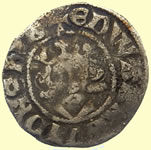 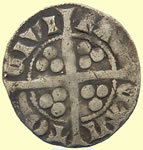 |
  |
||||||||||||||
1279 Edward 1st hammered silver penny Obv EDWAR ***L DNS hYB Rev CIVI/TAS/CAN/TOR - Canterbury mint |
1247 Henry III hammered silver voided long cross half penny Obv hENRICVS REX III Rev /RIO/NLV - Moneyer Henri of London |
||||||||||||||
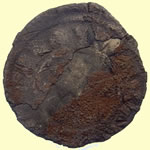 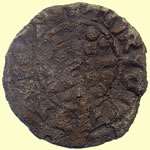 |
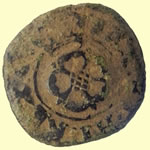 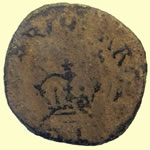 |
||||||||||||||
1279 Edward 1st hammered silver penny Obv EDWAR A ** Rev CIVI/TAS/CAN/TOR - Canterbury mint |
1634 Charles 1st hammered copper rose farthing | ||||||||||||||
  |
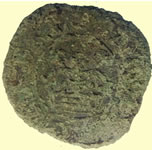 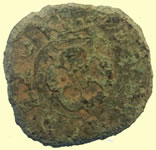 |
||||||||||||||
| 1666 hammered copper trade farthing | 1634 Charles 1st hammered copper rose farthing | ||||||||||||||
  |
 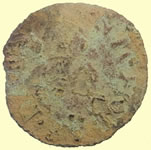 |
||||||||||||||
| 1634 Charles 1st hammered copper rose farthing | 1667 'in Wavenham' hammered copper trade farthing | ||||||||||||||
|
  |
||||||||||||||
| Roman 2nd C bird brooch | 17thC Henry Lamb of Colchester hammered copper trade farthing | ||||||||||||||
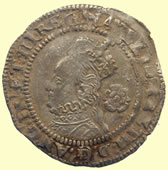 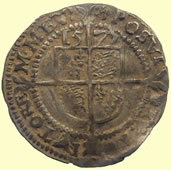 |
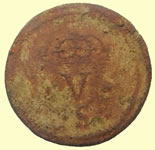 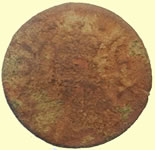 |
||||||||||||||
| 1565 Elizabeth 1st hammered silver three pence - Rose mint mark | 1625 Charles 1st Silver crown (five shillings) coin weight Obv Bust of Charles facing left Rev Crown VS |
||||||||||||||
Medieval strap end |
|||||||||||||||
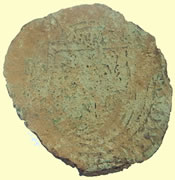 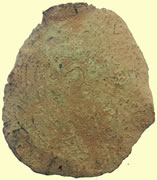 |
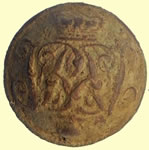 |
 |
|||||||||||||
| French copper-alloy Jetton 1380AD | Georgian Royal Engineers button ? | 16thC Tudor button | |||||||||||||
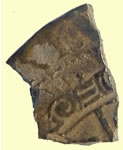 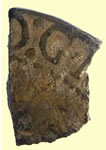 |
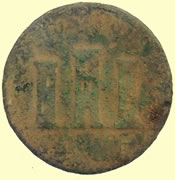 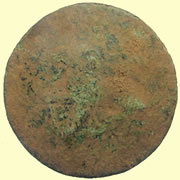 |
||||||||||||||
| Unknown hammered silver coin fragment - unusual border decoration ?? | 18thC Conder token | ||||||||||||||
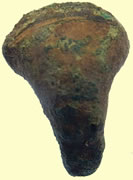 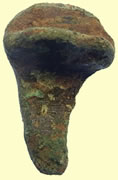 |
|
||||||||||||||
| 2ndC Roman fibualr brooch | Medieval strap end | ||||||||||||||
 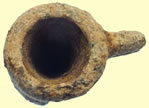 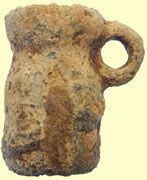 |
|||||||||||||||
| Very interesting early small lead alloy jug find, possible votive offering or even a medieval pilgrims ampular type item with suspension loop - needs more research | |||||||||||||||
 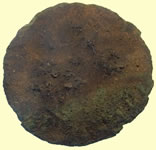 |
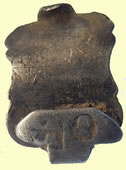 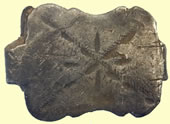 |
||||||||||||||
| 17thC Henry Lamb of Colchester hammered copper trade farthing | 18thC silver clog fastener - 1795 George III duty paid bust | ||||||||||||||
 |
 |
||||||||||||||
| 15thC casket key | 16thC Tudor S buckle | ||||||||||||||
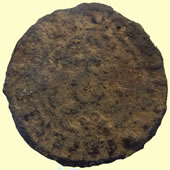 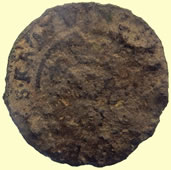 |
|||||||||||||||
| 1700 William III milled copper half penny | 1586 Hans Krauwincel II Rose orb Jeton | ||||||||||||||
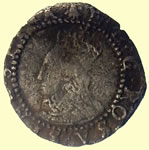 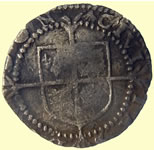 |
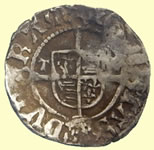 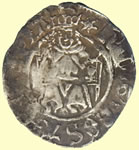 |
||||||||||||||
| 1584- 6 Elizabeth 1st hammered silver penny - Escallop mint mark |
|
||||||||||||||
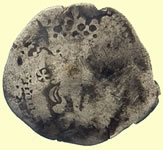 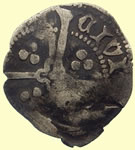 |
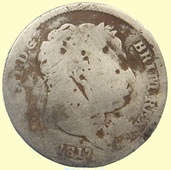 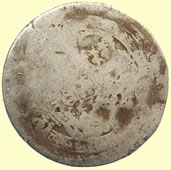 |
||||||||||||||
1413 Henry V hammered silver penny - mullet to left of hair Quadrefoil with pellet in reverse cross York mint |
1817 George III milled silver shilling | ||||||||||||||
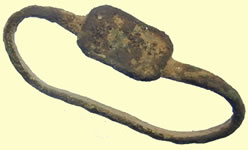 |
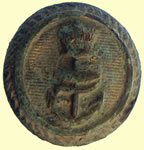 |
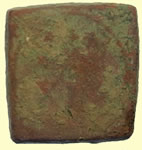 |
|||||||||||||
| Post medieval copper finger ring | RN Capt / Commander - 1901 |
17thC 12 shilling coin weight ( 144 pence) Rev Crown XII |
|||||||||||||
Saxon hammered silver penny - sent to Fitzwilliam museum for recording 20mm, 1.16g Many thanks for this new find, which is Offa of Mercia Heavy Coinage (792/3-796), East Anglian mint, moneyer Wihtred, reading UI / HT / [ ] / [ ]. This is type 258 in Derek Chick's The Coinage of Offa and his Contemporaries (part of North type 338). I have attached adjusted images showing the correct orientation, which might be helpful. |
|||||||||||||||
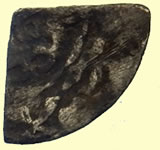 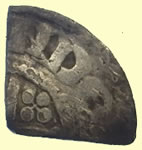 |
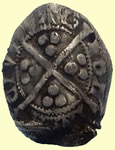 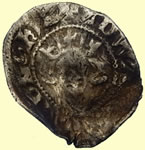 |
||||||||||||||
1216 Henry III hammered silver voided short cross farthing Rev NDE - London mint |
1279 Edward 1st hammered silver penny Obv EDWA*** DNS hYB Rev CIVI/TAS/LON/DON - London mint |
||||||||||||||
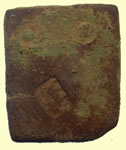 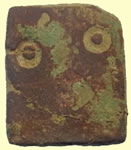 |
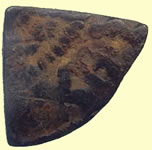 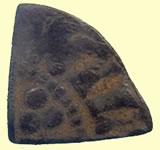 |
||||||||||||||
| 18thC bullion weight - Lion mark | 1247 Henry III hammered silver voided long cross farthing |
||||||||||||||
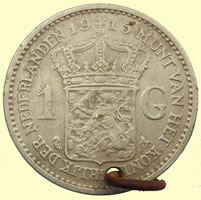 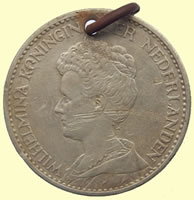 |
|||||||||||||||
1915 Dutch 1 gulden milled silver coin medallion Queen Wilhelmina I ruled the Kingdom of the Netherlands as a young lady starting in 1890 and continued to 1948 |
|||||||||||||||
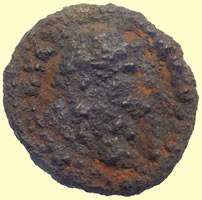 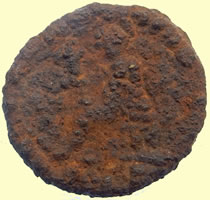 |
|||||||||||||||
Crusty 2ndC Roman silver coin - needs a good cook to remove horn crust The other piece shows a lot of detail - in sort of a "dumpy pointillist" manner - but none of the legends are clear enough to get even a single letter. From the thick-necked, "chunky" appearing silhouette (or what it's looking like to me) this might be one of the Flavians, or even, possibly, Nero (or Galba or Vitellius). Its reverse appears to be an enthroned/seated deity, personification or person facing left and posibly holding an object of some sort in its extended right hand (Zeus holding eagle? Pax holding olive-branch?), but there is not much else I can say about it. It should be interesting to see, as these clean up (possibly a longish process, it would appear) just how close my shots-in-the-dark came. Mark |
|||||||||||||||
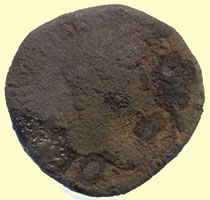 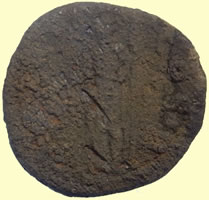   |
|||||||||||||||
Crusty 2ndC Roman silver coin - needs a good cook to remove horn crust Trajan or Hadrian - I can make out "...[A?, R?] IAN..." on the obverse and the silhouette could be either of them, I guess. On the reverse I believe I can make out ...COS II[?] which would make Hadrian a little more likely Mark |
|||||||||||||||
  |
|||||||||||||||
1158 -1189 AD Henry II hammered silver farthing ' Tealby' cross and crosslet type Sent to Fitzwilliam museum for recording Many thanks for these excellent new images of this find, which I have recorded as EMC 2015.0320. |
|||||||||||||||
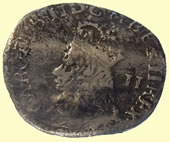 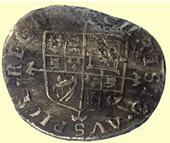 |
 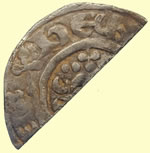 |
||||||||||||||
1662 Charles II milled silver half groat - love token Undated issue |
1217-18 Henry III hammered silver short cross half penny - Class 7c Rev +hENRI - Moneyer Henri |
||||||||||||||
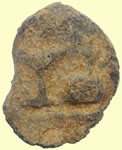 |
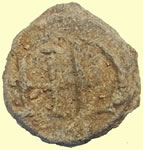 |
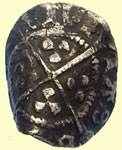 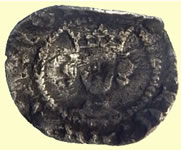 |
|||||||||||||
| 16thC Elizabethan illegal tavern token | 17thC lead token - HD | 1399- 1413 Henry IV hammered silver half penny Obv hENRICx REX x ANGL |
|||||||||||||
  |
|||||||||||||||
1279 Edward 1st hammered silver penny Obv + EDWAR *** YB Rev CIVI/TAS/CAN/TOR - Canterbury mint |
1696 William III milled silver shilling | ||||||||||||||
  |
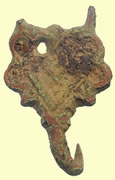 |
 |
|||||||||||||
| 1946 George V milled silver sixpence | 16thC Tudor clothing fastener | Victoria Royal Engineers button | |||||||||||||
  |
  |
||||||||||||||
1279 Edward 1st hammered silver penny Obv EDWAR ANGL DNS hYB Rev CIVI/TAS/LON/DON - London mint |
ex rare . 1205 - 1230 AD William 1st The Lion of Scotland short cross hammered silver penny.Class II Obv +LEI ** Rev + hV - Moneyer Hue Walter of Roxburgh mint Ref SW11D-065 |
||||||||||||||
 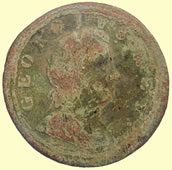 |
  |
||||||||||||||
| 1724 George 1st milled copper half penny | 1327 Edward III hammered silver penny Obv EDWAR *** ANGLI Rev CIVI/TAS/**** |
||||||||||||||
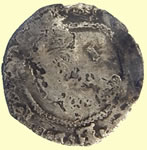 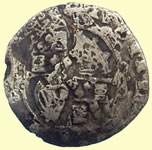 |
  |
||||||||||||||
| 1625 Charles 1st hammered silver penny | 1279 Edward 1st hammered silver penny Obv EDWR ANGL DNS hYB Rev CIVI/TAS/CAN/TOR - Canterbury mint |
||||||||||||||
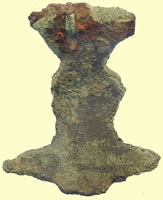 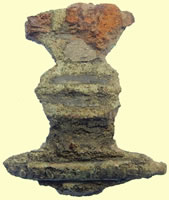 |
  |
||||||||||||||
| 1st to 2nd Hinge - head Roman brooch | 2nd Roman fibular brooch | ||||||||||||||
 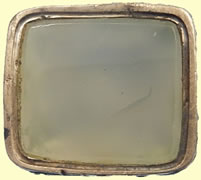 |
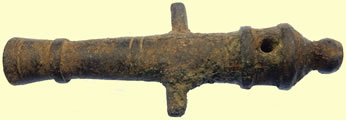 |
||||||||||||||
| Geogian gold plated fob seal | 18thC toy cannon | ||||||||||||||
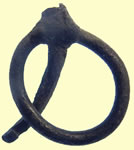 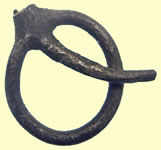 |
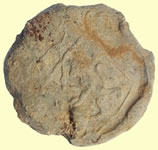 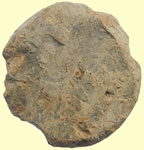 |
||||||||||||||
| Tiny Georgian silver clasp | Post medieval lead bale seal | ||||||||||||||
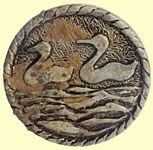 |
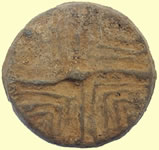 |
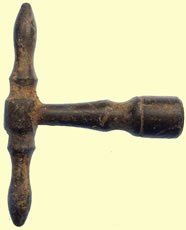 |
|||||||||||||
| 20thC button | 15thC lead token | Georgian barrel tap key | |||||||||||||
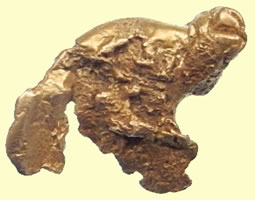 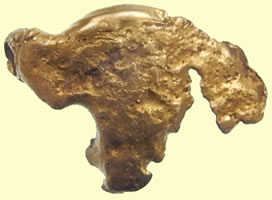 |
|||||||||||||||
| Pure ancient gold nugget - reported as potential treasure to museum - 1.09g | |||||||||||||||
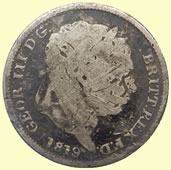 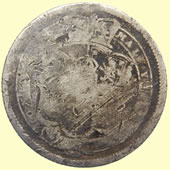 |
|||||||||||||||
| 1696 William III milled silver sixpence | 1819 George III milled silver shilling | ||||||||||||||
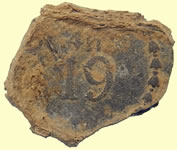 |
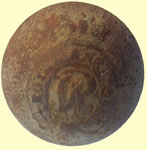 |
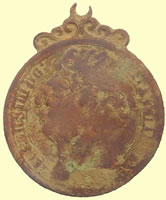 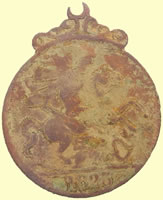 |
|||||||||||||
| 18thC - 19th Regiment of foot button | 19thC Victorian Royal Enginners button | 1823 Gerge IV medallion Saint George slaying the dragon. A crude imitation of Pistrucci's masterpiece found on British coinage to this day. |
|||||||||||||
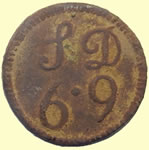 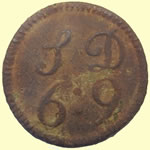 |
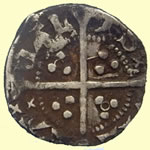 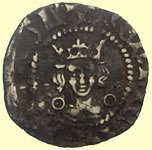 |
||||||||||||||
1770's coin weight - six shillings and nine pence Obv S6 9D |
1422-61 Henry VI hammered silver half penny - Roundabout mint mark - A2 annulet issue Rev with annulets in VIL and CAL qtrs. Obv + hENRIC REX ANGL Rev VIL/LAx/CAL/ISx |
||||||||||||||
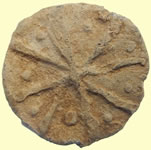 |
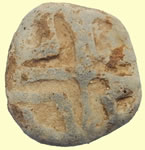 |
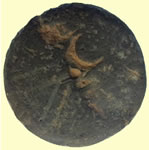 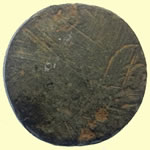 |
|||||||||||||
| 15thC lead token | 15thC lead token | 1625 Charles 1st coin weight - C London | |||||||||||||
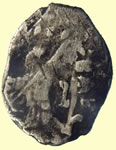 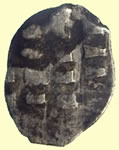 |
|||||||||||||||
Tiny silver coin - Indian fanim ??? 1 Kopeck minted during the rein of Peter The Great between 1696 and 1717. The wire kopecks of that period were the lightest and smallest of all Russian wire specie, and had the lowest silver content. |
|||||||||||||||
|
  |
||||||||||||||
| 17thC silver seal matrix - reported as treasure to museum | 1216 Henry III hammered silver short cross half penny Obv hEN*** REX Rev N.LV+WIL - Moneyer Willem of London mint |
||||||||||||||
  |
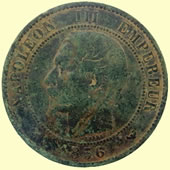 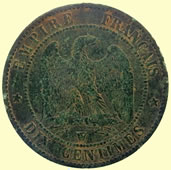 |
||||||||||||||
1247 Henry III hammered silver voided long cross half penny Obv REX III *' Rev /OLE/ON - Moneyer Nicole |
1856 Napoleon III - 7 centimes copper coin | ||||||||||||||
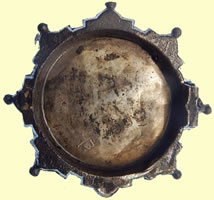 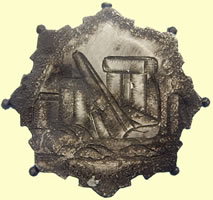 |
|||||||||||||||
| Stone henge silver medallion pendant - Birmingham 1892 | |||||||||||||||
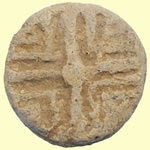 |
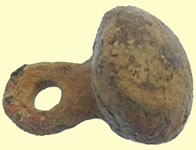 |
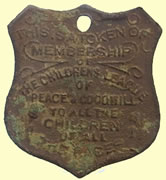 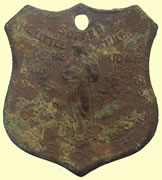 |
|||||||||||||
| 15thC lead token | 16thC Tudor button | Victorian - The Childrens League membership badge First side, Suffer the little children to come unto me, for I am the good Shepherd ( inscription around symbol of Jesus) |
|||||||||||||
 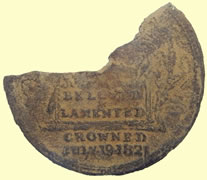 |
  |
||||||||||||||
| George IV crowned June 19th 1821 - death medallion | 2ndC Roman fibular brooch fragment | ||||||||||||||
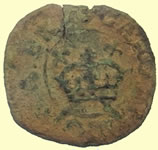 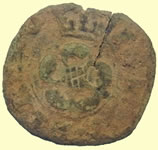 |
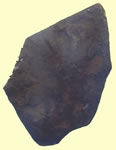  |
||||||||||||||
| 1634 Charles 1st hammered copper rose farthing | Only 2nd cut qtr Tealby we have ever found 1158 -1189 AD Henry II hammered silver farthing ' Tealby' cross and crosslet type Sent to Fitzwilliam museum for recording (216) |
||||||||||||||
 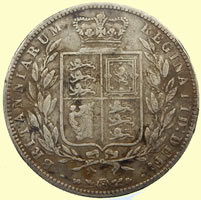 |
|||||||||||||||
| 1876 Victoria milled silver half crown | |||||||||||||||
 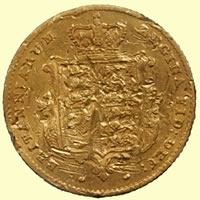 |
|||||||||||||||
| 1857 Victoria milled gold sovereign | |||||||||||||||
  |
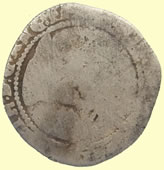 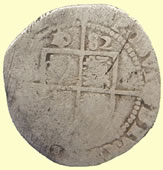 |
||||||||||||||
1154 Henry II hammered silkver short cross half penny Obv CO+ROD - Moneyer Rodbert of Lincoln mint |
1582 Elizabeth 1st hammered silver half groat (218) |
||||||||||||||
  |
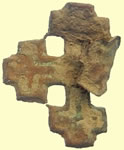 |
||||||||||||||
| 1279 Edward 1st hammered silver penny | 'A badge for a Knight of the Order of the Holy Sepulchre in bronze and dating somewhere around C13/14th possibly very slightly later . This is a very scarce item and it relates to The Equestrian Order of the Holy Sepulchre of Jerusalem being a Catholic chivalric order of Knighthood that traces its roots to Godfrey of Bouillon, principal leader of the First Crusade. According to reliable sources in the Vatican and Jerusalem, it began in historical reality as a mixed clerical and lay confraternity (association) of pilgrims which gradually grew around the most central of the Christian holy places in the Middle East, the Holy Sepulchre or the tomb of Jesus Christ.This would have been a pin for a member of the order , there is a mark on the reverse where the original pin would have been fixed ' Medieval badges Ref Mitchiner p244 939 - 941 |
||||||||||||||
 |
 |
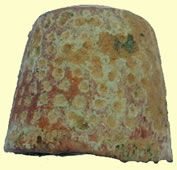 |
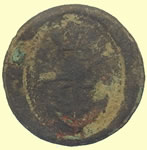 |
||||||||||||
| 20thC enameled 'Strength clean thorough' badge | Georgian watch winder | 15thC thimble | RN Capt / Commander - 1812 | ||||||||||||
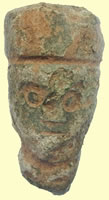 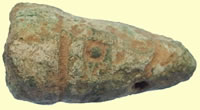 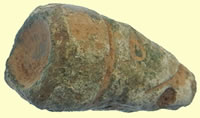 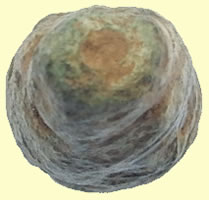 |
|||||||||||||||
| Romano British bronze head - possible votive offering or hanging pendant | |||||||||||||||
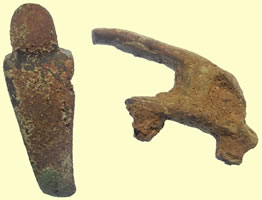 |
  |
||||||||||||||
| 2 - 18thC bayonet frogs | Irish 1279-1301 Edward 1st hammered silver penny - Trefoil of pellets on Kings breast, pellet at start of Obv legend Obv EDWR ANGL DNS HYB Rev CIVI/TAS/DUBL/INIE - Dublin mint |
||||||||||||||
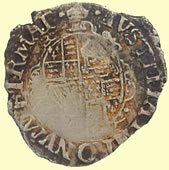 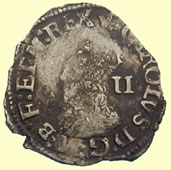 |
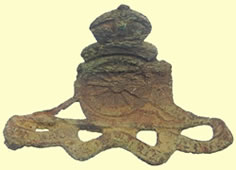 |
||||||||||||||
| 1635- 6 Charles 1st hammered silver half groat | WWII Royal Artillery badge | ||||||||||||||
Big 1stC Roman bronze sent for ID At first I thought your coin was a Trajan sestertius with a "Platform Scene" reverse - somewhat like in the photo below: I think, from the shape of the head and the general silhouette, your specimen is pretty definitely Trajan - let me see if I have a photo of a Trajan platform scene...
Trajan, 98-117 AD. I'm not saying this is a match for your coin - but at first I thought it was fairly close - Trajan had several platform scenes on his sestertii. Your coin seems to have a similarly long-winded list of titles in the obverse legend. Trajan had some of the longest legends/greatest numbers of letters in obverse legends ever to be strung around the circumference of a coin. I assembled this comparison photo which makes a pretty good case for Trajan on the obverse -
But as I look at the reverse more, I don't think this is a platform scene after all - I believe this would have for its legend SENATVS POPVLESQVE ROMANVS / SC - and the lower serifs of letters at ~ 2:00-4:00 reverse would fit with Romanus. There is a type on which Trajan is standing to right, head left, between two trophies - unfortunately, I don't have any photos of anything particularly similar, but if you look closely at the photo or the coin I think you can see how he's standing with his weight on the right leg, head turned to left, and there are 2 trophies, 1 each erected on his right and left. I will look for a photo of a coin with this reverse type and if I find one, I'll send it. Mark
I was unable to find quickly a photo of a sestertius with that reverse - in fact, I may need to say I think your piece is a dupondius, since it seems like no sestertius with that reverse type is listed. I'll admit I can't be certain that the portrait on your coin is not wearing the radiate crown of Sol which would be the identifying mark of denomination on the obverse.
This is what I thinik your coin might be - depending on size and whether we can make out a radiate crown. If it's large enough to be a sestertius and has a laurel-wreath portrait, that's something I'd need to ask an expert about - whether or not that particular type which is not in the RIC exists. Mark
|
|||||||||||||||
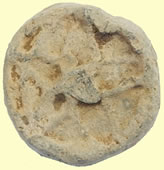 |
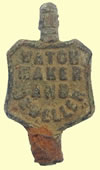 |
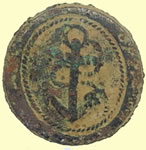 |
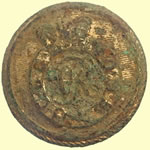 |
||||||||||||
| Medieval lead trade weight | Georgian watch winder | RN Capt / Commander - 1787 |
19thC Customs button | ||||||||||||
Medieval strap end |
|||||||||||||||
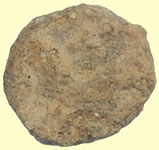 |
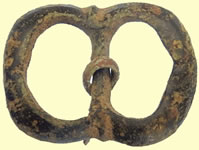 |
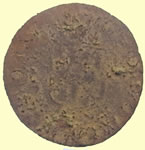 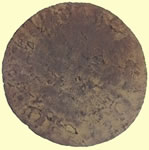 |
|||||||||||||
| 17thC lead token | 1500- 1650 buckle | 17thC hammered copper trade farthing | |||||||||||||
  |
 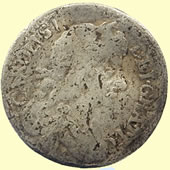 |
||||||||||||||
| 1247 Henry III hammered silver voided long cross half penny | 1679 Charles II milled silver three pence | ||||||||||||||
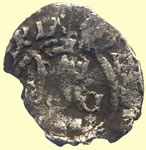 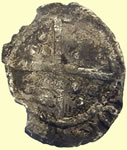 |
|
||||||||||||||
1533- 56 Henry VIII hammered silver half penny - Archbishop Thoman Cranmer - TC at sides of bust OBV hxDxGxROSAxSIExSPIA Rev CIVI/TAS/CAN/TOR - Canterbury mint |
Medieval book clasp | ||||||||||||||
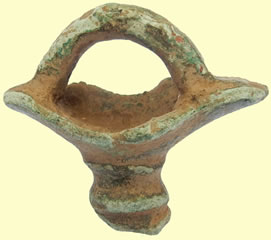 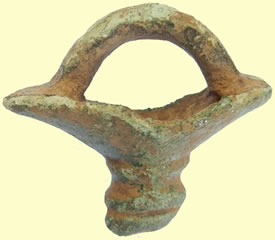 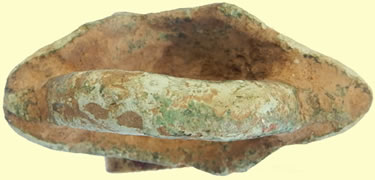 |
|||||||||||||||
Romano-British protected loop terret 'Protected loop terrets are usually considered to be Roman and dating to the late first and second centuries AD' |
|||||||||||||||
|
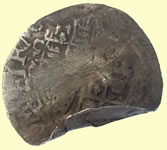 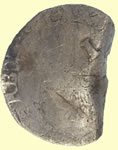 |
||||||||||||||
| 1573 - 1577 Elizabeth 1st hammered silver sixpence - Eglantine mint mark |
1625 Charles 1st hammered silver penny
|
||||||||||||||
  |
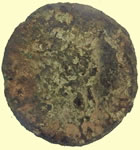 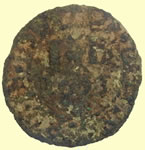 |
||||||||||||||
1327 Edward III hammered silver penny Obv EDWAR ANGL DNS hYB Rev CIVI/TAS/DVR/ENE - Durham mint (225) |
1653 hammered copper trade farthing | ||||||||||||||
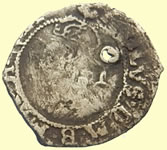 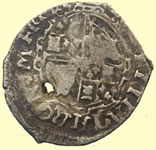 |
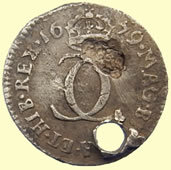 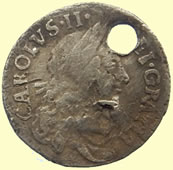 |
||||||||||||||
| 1625 Charles 1st hammered silver penny | 1679 Charles II milled silver two pence | ||||||||||||||
  |
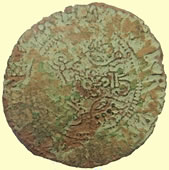 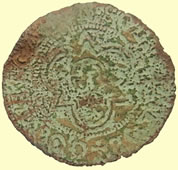 |
||||||||||||||
1216 Henry III hammered silver short cross half penny Unknown die type - the X is missing in REX but has a single dot from a cross pommee?? Class 8b3 Obv hE **** RE. Rev ERD.ON - Moneyer Rodberd of Canterbury mint
|
1586 Hans Krauwincel II Rose orb Jetton HANNS KRAVWINCKEL IN NVRENB |
||||||||||||||
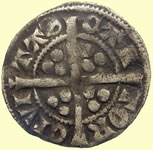 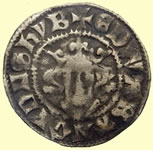 |
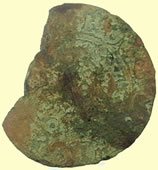 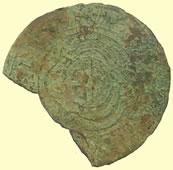 |
||||||||||||||
1300- 10 Edward 1st hammered silver penny - Class 10 Obv EDWAR ANGL DNS hYB Rev CIVI/TAS/CAN/TOR - Canterbury mint (228) |
1586 Hans Krauwincel II Rose orb Jetton HANNS KRAVWINCKEL IN NVRENB |
||||||||||||||
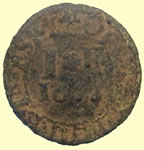 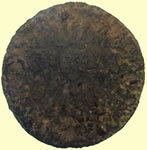 |
|||||||||||||||
1653 Jeremy Erds of Manningtree Essex hammered copper trade farthing Obv I.E 1653 |
1696 William III milled silver sixpence | ||||||||||||||
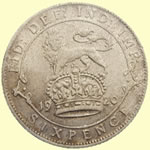 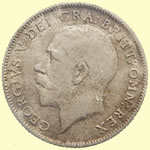 |
|||||||||||||||
| 1697 William III milled silver sixpence | 1920 George V milled silver sixpence | ||||||||||||||
 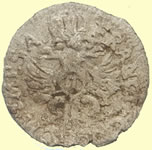 |
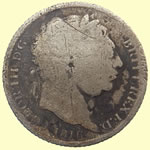 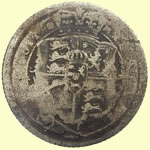 |
||||||||||||||
Classed as rare 1747 German states silver billion coin ??
ObverseCrowned Imperial Eagle Lettering: ReverseKey within ornate shield Lettering: MON.NOV.REIP.BREM. [date]
|
1816 George III milled silver sixpence | ||||||||||||||
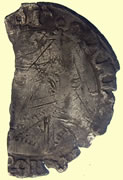 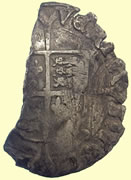 |
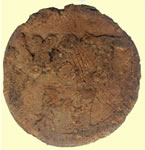 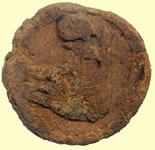 |
||||||||||||||
1553 Mary hammered silver groat (229) |
17thC lead token Obv H W T Obv Boars head facing right |
||||||||||||||
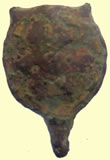 |
 |
 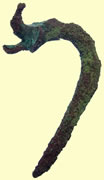 |
|||||||||||||
| 16th clothing fastener | WWII Royal fuseliers badge | 2ndC Roman fibular brooch | |||||||||||||
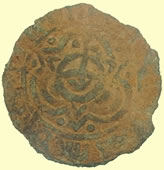 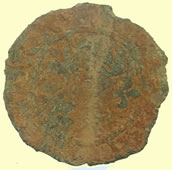 |
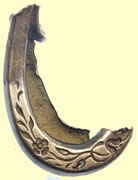 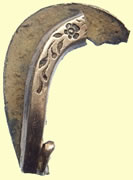 |
||||||||||||||
1586 Hans Krauwincel II Rose orb Jetton HANNS KRAVWINCKEL IN NVRENB |
Victorian gold brooch fragment | ||||||||||||||
16thC decorated precision instrument - dividers
|
|||||||||||||||
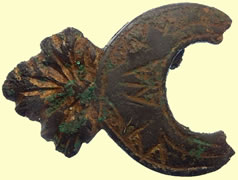 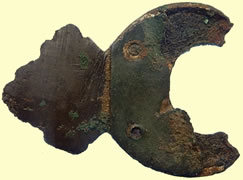 |
|||||||||||||||
| Post medieval gilded mount | |||||||||||||||
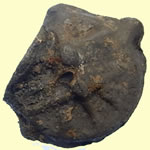 |
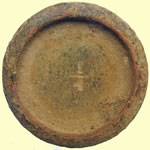 |
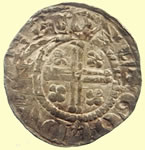 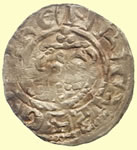 |
|||||||||||||
| Early medieval lead token | Victorian 1/4 oz trade weight | Double struck both sides 1189 Richard 1st hammered silver short cross penny- Class 3 Obv hENRICVS RE GO Rev + GOLDWINE *** - Moneyer Goldwine |
|||||||||||||
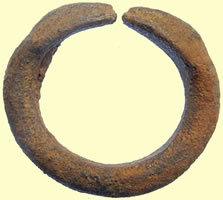  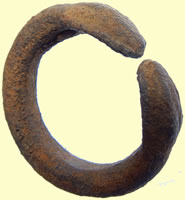 |
|||||||||||||||
| Iron Age snake headed finger ring | |||||||||||||||
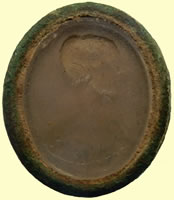 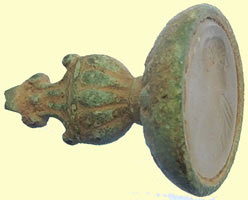 |
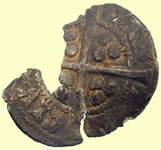 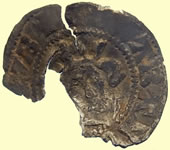 |
||||||||||||||
| Georgian fob seal - womans bust facing right | 1279 Edward 1st hammered silver penny Obv EDWAR *** hYB Rev CIVI/***/CAN/TOR - Canterbury mint |
||||||||||||||
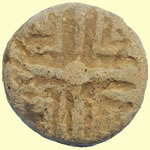 |
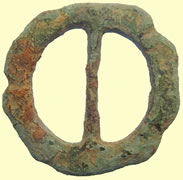 |
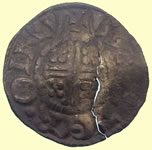 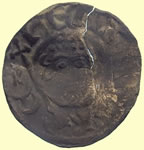 |
|||||||||||||
| 15thC lead token | 1500-1650 buckle | 1199 John hammered silver short cross penny - Class 5c Obv hENRICVS REX Rev ON.LV + RALTER - Moneyer Ralter of London mint (232) |
|||||||||||||
Cooked Roman silver coin sent for ID Chris, This piece was struck at the mint in Rome, Jan.-Sep. 97. Mark |
|||||||||||||||
  |
 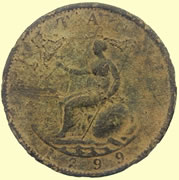 |
||||||||||||||
1279 Edward 1st hammered silver penny - Cross Moilne Obv EDWAR ANGL DNS hYB Rev CIVI/TAS/DVR/EME - Durham mint
|
1799 George 1st milled copper penny | ||||||||||||||
  |
  |
||||||||||||||
1279 Edward 1st hammered silver penny - Class 3d - Annulat tail R Obv EDWR ANGL DNS hYB Rev CIVI/TAS/LIN/COL' - Lincoln mint
|
1601-2 Elizabeth 1st hammered silver half groat - 1 mint mark (237) |
||||||||||||||
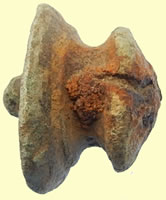 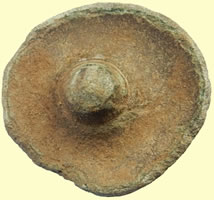 |
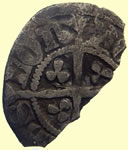  |
||||||||||||||
| Roman bronze mount | 1279 Edward 1st hammered silver half penny Obv ****RDVS REX Rev TS/LON/D - London mint |
||||||||||||||
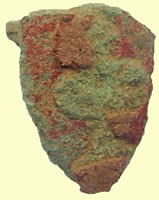 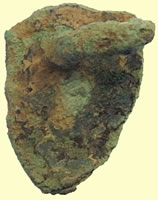 |
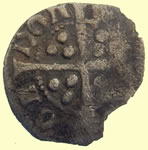 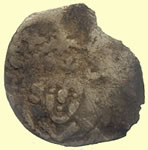 |
||||||||||||||
| Medieval heradic enamelled mount - reseaching owner | 1351-61 Edward III hammered silver farthing Obv +EDWARDVS REX Rev CIVI/TAS/LON/DON - London mint (239) |
||||||||||||||
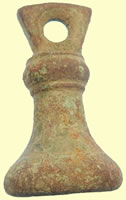 |
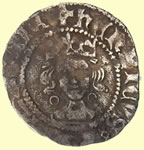 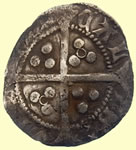 |
||||||||||||||
| Georgian bell trade weight | 1422-61 Henry VI hammered silver penny - Roundabout mint mark - annulet issue Rev with annulets in VIL and CAL qtrs. Obv + hENRICVS REX ANGLIE Rev VIL/LAx/CAL/ISx (240) |
||||||||||||||
 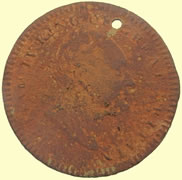 |
|
||||||||||||||
| William IV death medallion June 20th 1837 | Roman decorated buckle | ||||||||||||||
|
|||||||||||||||
| C1000 BC Bronze Age sword blade fragment | |||||||||||||||
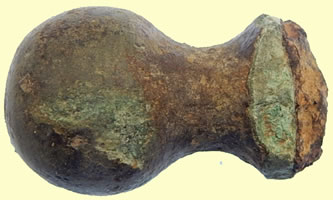 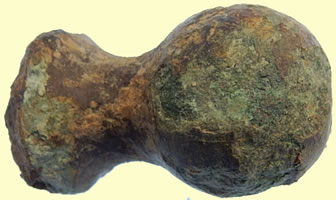 |
|||||||||||||||
| Roman bronze knife pommel | |||||||||||||||
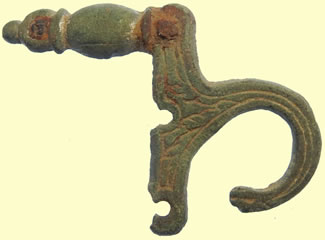 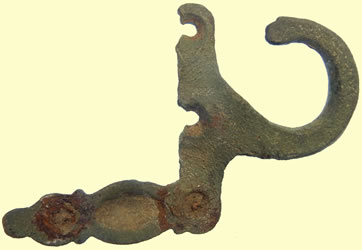 |
|||||||||||||||
| 16th/17thC sword hanger fitting | |||||||||||||||
 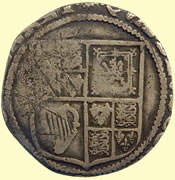 |
  |
||||||||||||||
| 1606-7 James 1st hammered silver shilling (12 pence) Escallop mint mark | Medieval rams head bucket mount | ||||||||||||||
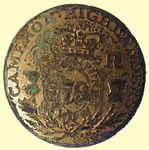 |
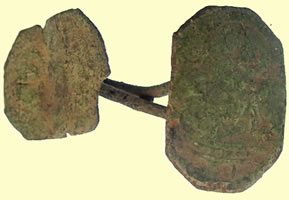 |
||||||||||||||
| 19thC 79th Regiment of Foot - Cameron Highlanders | Medieval clothing fastener - King in a ship design - similar to Ryal coin weight | ||||||||||||||
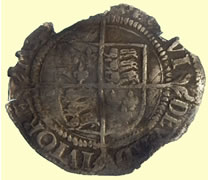 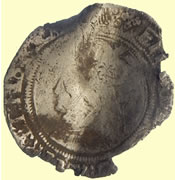 |
 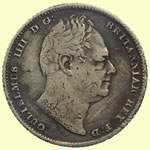 |
||||||||||||||
1560-1 Elizabeth 1st hammered silver sixpence- mint mark Cross crosslet (246) |
1834 William IV milled silver sixpence | ||||||||||||||
 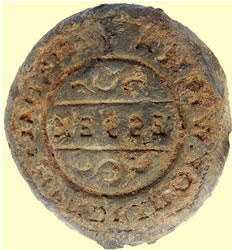 |
|||||||||||||||
| 17thC lead seal - 'ESSEX' - cleaning up legend | |||||||||||||||
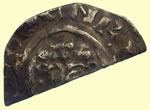  |
  |
||||||||||||||
| 1216 Henry III hammered silver short cross half penny | 1216 Henry III hammered silver short cross half penny
|
||||||||||||||
Facinating find - 1774 George III milled copper half penny struck twice on edge in the milling machine |
|||||||||||||||
  |
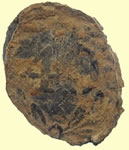 |
||||||||||||||
1279 Edward 1st hammered silver penny Class 9b– Obv +EDW **ANGL DNS hYB Rev VILL/SCIE/DNV/NDI – Bury St Edmunds mints 249 |
18thC 40th Regiment of foot button The 40th (2nd Somersetshire) Regiment of Foot was an infantry regiment of the British Army, formed in 1717 and amalgamated into The Prince of Wales's Volunteers (South Lancashire Regiment) in 1881 |
||||||||||||||
  |
  |
||||||||||||||
1340 AD French Jetton Crown introduced in 1340 by Philip VI (1328-50) Royal Crown Rev Triple banded straight cross fleuretty AV |
1296 Edward 1st hammered silver penny Class 1 Berwick mint Crown with pearls- Open Lombardic E Obv +EDWR ANGL DNS hYB Rev VILL/aBE/REV/VICI - Berwick Upon Tweed mint |
||||||||||||||
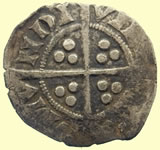  |
  |
||||||||||||||
1307 Edward II hammered silver penny - pointed back E - Class 15 Obv +EDWR ****NS hYB Rev VILL/SCIE/DMV/NDI - Bury St Edmunds mint 252 |
16thC Gold angel coin weight | ||||||||||||||
  |
  |
||||||||||||||
| 1558- 60Elizabeth 1st hammered silver penny - Lis mint mark | 1279 Edward 1st hammered silver penny Obv +EDWA***DNS hYB Rev CIVI/TAS/LON/DON - London mint 254 |
||||||||||||||
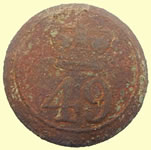 |
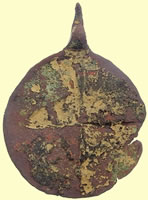  |
||||||||||||||
| 1855-1881 49th Regiment of foot button | medieval harness pendant | ||||||||||||||
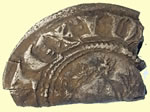 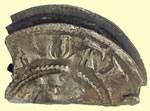 |
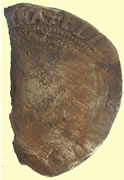 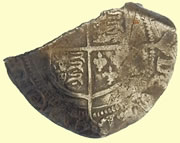 |
||||||||||||||
13thC Continental sterling silver imitation - Crockard , chaplet of rosettes Obv + ID *** IC Rev **ANAL*** |
1560-1 Elizabeth 1st hammered silver sixpence - Cross crosslet mint mark | ||||||||||||||
850 BC Bronze Age socketed axe head fragment |
|||||||||||||||
 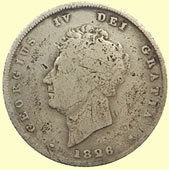 |
  |
||||||||||||||
| 1826 George IV milled silver shilling | Early medieval lead token | ||||||||||||||
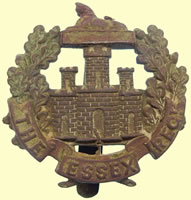 |
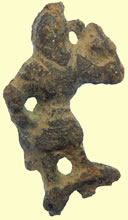 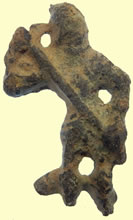 |
||||||||||||||
| WWII Essex regiment cap badge | Roman votive figurine | ||||||||||||||
  |
 |
||||||||||||||
| 15thC Angel figure qtr gold noble coin weight | Georgian trade weight - Crown G cipher | ||||||||||||||
  |
 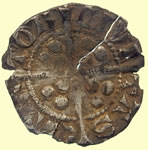 |
||||||||||||||
| 1582 -3 Elizabeth 1st hammered silver penny | 1279 Edward 1st hammered silver penny - Class 10ab Obv EDWARD R ANGLE DNS hYB Rev CIVI/TAS/CAN/TOR - Canterbury mint |
||||||||||||||
20thC gold pendant with glass stone |
|||||||||||||||
2nd C Roman silver coin - needs a good 'cook' to remove the crust |
|||||||||||||||
Previous 2015 Sept finds page click here |
|||||||||||||||
 |
|||||||||||||||




